July 31 - August 6, 2016: Issue 274
Shopping And Shops In Manly: Sales Times From 1856 To 1950 For A Fishing Village
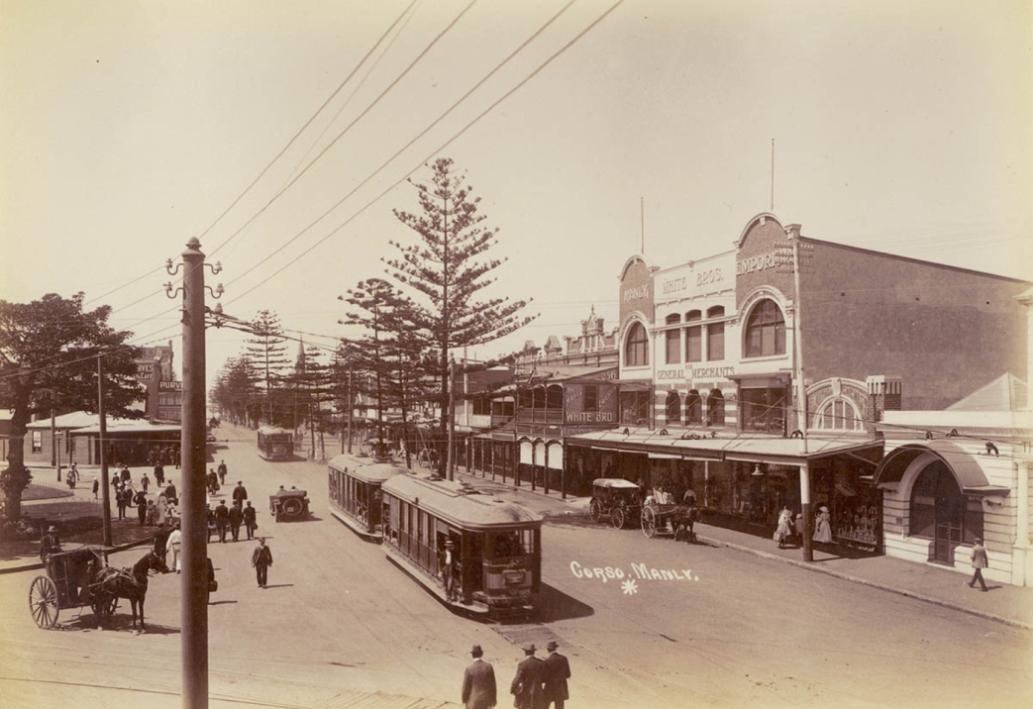
Manly Corso [showing trams] ca. 1900-1910. Image No.: a116256, courtesy Mitchell Library, State Library of New South Wales.
Now attracting masses of crowds during the annual Manly Jazz, Art and Food Festivals, the ‘village’ of Manly once expanded its population during the peak Summer times when steamers and then ferries conveyed thousands of people to the beachfront bay of bliss.
Each year, during January, June and until July 31, and into August for ‘Final Clearances’ a similar ‘many of us’ will visit the larger shopping venues to secure bargains – sheets we’ll put away until old ones have worn out, shoes required to replace worn out soles, as our forebears did in the past.
Although Manly’s shops were functional, catering to a year round permanent population, and then to the crowds that would come year round and en masse during the ‘Season’, these shops would sell out too, especially during Summer.
There are even other incidences of being short of what was needed, such as the 1911 dispute over meat, ludicrous from this distance, where the NSW Health Department was determined to introduce measures to stop people being poisoned by bad meat, in this early instance by enclosing butchers shops with glass or gauze wire, yes, decades before things like refrigeration!, and Manly Council backed their local suppliers to withstand such totalitarian measures, with the perpetuated result of course, and rescinded this order.
Manly Council was not alone in being a bit behind the times here as reports and incidences of 'ptomaine poisoning', a type of food poisoning, gastrointestinal disorder and illness caused by poisonous or contaminated food, continued in periodicals of the time, and would for a few decades. In most instances, particularly where Inquests were held following the death by the same, records indicate it is contaminated meat consumed by those who have died that is to blame.
More than half a century prior to the advent of such skirmishes people from Pittwater and Manly, and all points in between, would have gone right into ‘Sydney Town’ for the sales, and even to sell their own produce as all were food bowl areas or places from which salt, timber and shells for making lime to cement building together was drawn. Manly was a lace where the incautious could lose their lives, bringing tragedy to those they left behind.
CAUTION.-The Public are hereby cautioned against trespassing, by Stock or otherwise, on those Farms situate on the East side of North Harbour, contiguous to Manly Beach, as any future Encroachment on those Lands will meet with the most rigid Prosecution from Mr. R. Campbell, the present Proprietor.
N. B.-The Stockmen have Orders to impound all Cattle that may hereafter be found trespassing thereon. Classified Advertising (1814, May 14). The Sydney Gazette and New South Wales Advertiser (NSW : 1803 - 1842), , p. 1 (Supplement to the Sydney Gazette, and New South Wales Advertiser). Retrieved from http://nla.gov.au/nla.news-article628913
Last Sunday se'nnight two fine boys, one eight and the other nine years old, sons of John Randall, in the employ of Mr. R. Campbell, jun. were drowned in attempting to cross Manly Beach in a boat, a tremendous surf being on at the time, which rendered their feeble exertions unavailing. One of the bodies was found nine days after, close in shore, but the other has not yet been recovered. Sydney. (1816, July 13). The Sydney Gazette and New South Wales Advertiser (NSW : 1803 - 1842), , p. 2. Retrieved from http://nla.gov.au/nla.news-article2176725
This shows that getting to Manly via a boatman was far more expensive than it would be only a few short decades later, when people came via steamers, and may not have been utilised that much by would-be picnickers:
GOVERNMENT AND GENERAL ORDERS.
SECRETARY'S OFFICE, 9th December, 1820.
CIVIL DEPARTMENT.
HIS EXCELLENCY the GOVERNOR, on the Recommendation of WILLIAM MINCHIN, Esq. Superintendent of Police, has been pleased to order and direct, that from and after the 16th Instant, the Watermen, plying within the Harbour of Port Jackson, shall be authorised to demand and receive the Sums mentioned in the following Scale for their Services ; viz.
One or more Person to or from -Ditto ditto Manly Beach, or Kissing Point. 0 | 10 | 0 – (10 shillings) GOVERNMENT AND GENERAL ORDERS. (1820, December 9). The Sydney Gazette and New South Wales Advertiser (NSW : 1803 - 1842), , p. 1. Retrieved from http://nla.gov.au/nla.news-article2179938
On Wednesday, an Inquest was convened at the Rising Sun Inn in Prince Street, by E. S. HALL, Esq. Coroner, on the body of a man that had been discovered lying on Manly Beach, in a state of perfect putrescence. It was brought to Town for the purpose of identity, if possible; and to ascertain how the deceased came by his death. A man of the name of John Smith, with an assigned servant, have disappeared very recently, together with their boat, and it is strongly conjectured that the body in question was either that of Smith, or his man. Under all the circumstances, however, no other verdict could be returned than that of— Found drowned. Sydney. (1821, July 21). The Sydney Gazette and New South Wales Advertiser (NSW : 1803 - 1842), , p. 3. Retrieved from http://nla.gov.au/nla.news-article2180369
Harris, from Pitt Water, with 300 bushels shells COASTERS INWARDS. (1850, June 19). The Sydney Morning Herald (NSW : 1842 - 1954), , p. 2. Retrieved from http://nla.gov.au/nla.news-article12918845
Soon people sought the cooling breezes of Manly Beach: see Issue 192: - Manly's Stone Kangaroo, Camera Obscura, First Maze and 'Chute' - Fun Days in Sea Hazes from 1857
MANLY BEACH.
Yesterday, Boxing Day, the people of Sydney left their homes en masse, and shaking off from their feet the dust of the city, hied them as swiftly as steam would carry them to the sea shore. The great crowd, numbering, we should say, some ten thousand, flocked towards Manly Beach, and the carrying capacities of the dozen steamers employed were severely tested. We missed on this occasion, when it was most needed, the presence of the band, whose members, if they had exercised forethought, might have reaped a splendid harvest. But though lacking harmonious strains, there was animation enough aboard the steamers, every one of which was literally crammed with passengers, so crammed, indeed, that the speed of the vessels was very materially reduced. But nothing whatever occurred from this over-crowding, and we must commend those in charge of the boats for using due precautions that no accident happened.
Manly itself throughout the day was alive with holiday seekers, who dotted the sea-shore, ascended the rocks leading to the fairy bower, wandered hither and thither laughingly around and about and through the maze, clambered up to the camera tower, where a magnificent landscape lay glorious before them, and lingered about Grocotts Pier Hotel, where there was no lack of good things for sustenance and refreshment.
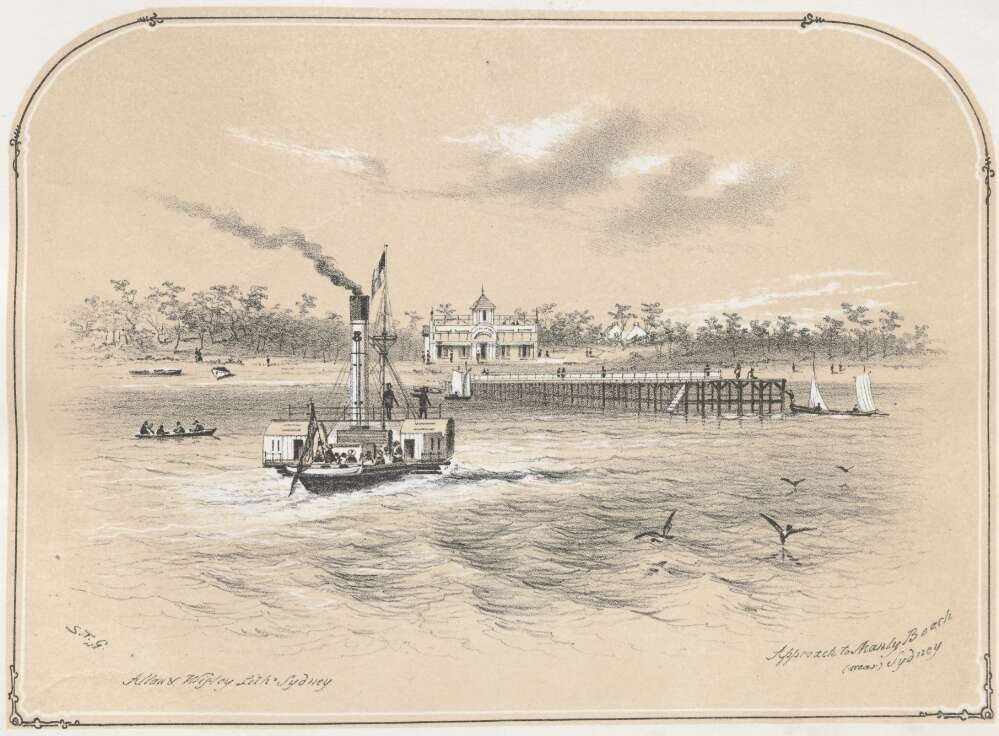
'Approach to Manly Beach near Sydney' [picture] / S.T.G, lithograph by Sydney : Allan & Wigley lith., [1856] courtesy National Library of Australia. http://nla.gov.au/nla.obj-135666969
Some of the more lusty among the people hurled quoits, whilst not a few played at a game in which the chances were twenty to one in favour of the individual who promoted the sport. The game was simple, but calculated to fill the pockets of the ancient mariner, who perpetually sang out, "Three half crowns for a shilling," and who uttered now and again, sarcastic phrases, which inflamed the weak-minded, and tempted them to spend more shillings in the fruitless endeavour to gamble half-crowns. The game is called "Three Sticks a Penny" but this cunning old man, as it was holiday time, charged a shilling for three sticks-and certainly, he circumvented the vernal rustics in a marvellous manner.
He was only playing upon the gambling propensities of his supporters, some of whom, we believe, could ' not pay their passage back to Sydney. But wisdom must be bought.
As the Manly Beach donkies have become rather notorious of late, owing to the illustrious personages who have bestraddled them, we wish to say a word in their behalf. We all know that donkies have skins of perdurable toughness, and are of slow and uncertain pace, but the Manly Beach donkies ought to refuse work altogether. We saw some of them cruelly used yesterday, so badly and abominably treated as to excite angry comments from passers-by. The half starved animals, for they have no flesh, and their bones preach how innutritious is the salt bush, were loaded with boys, and were kicked, cuffed, and thrashed in a shameful manner. The owners of these donkies, if they have bowels of compassion, ought to prevent these abuses, for they are flagrant and patent, and are a disgrace to Manly. There was no music at Manly, an omission much to be regretted, and probably a band could not be obtained. MANLY BEACH. (1859, December 27). The Sydney Morning Herald (NSW : 1842 - 1954), , p. 4. Retrieved fromhttp://nla.gov.au/nla.news-article13034926
1877 to 1886 - A Constructive Time of Securing a Wharf Instead of a Pier, Tree Lined Thoroughfares, A 'Corso' and Open Green Spaces
Henry Gilbert Smith, who is reputed to have and built the first wharf also hired the first steamer to bring people to Manly, The Brothers in 1854. This first 'ferry' was followed quickly by steamers that brought the above tens of thousands several times a day, and these masses presented a problem of access. How to overcome this was one of the first issues addressed by the Municipality of Manly, first incorporated on 6 January 1877, as well as turning the path from pier to sea into something more pleasant. Manly Council met for the first time on 15 February 1877, when Manly's first mayor was elected, Thomas Rowe, father of Ruskin Rowe of Ruskin Rowe, the street, also tree lined, of Avalon Beach.
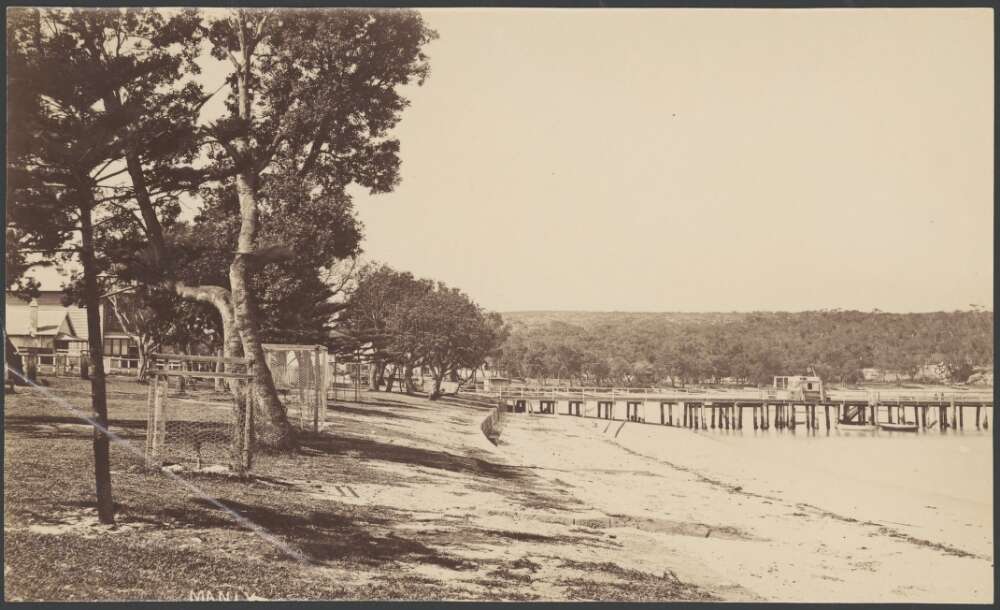
'Pier at Manly', New South Wales, ca. 1876, photo by Charles Bayliss - courtesy National Library of Australia http://nla.gov.au/nla.obj-141520962
Municipal Improvements at Manly.
Perhaps at no place more than at Manly are the advantages of municipal government to be seen, and the wonder is that a number of persons in these times of enlightenment can be found to resist such an efficient method of managing local affairs. The roadway from the pier to the sea beach is being constructed and planted with trees to form a pleasant promenade. Is a very short space of time property in the immediate neighbourhood will greatly improve in value, and Manly turn out the attraction to many more thousand visitors than hitherto. The improvements are to be extended to the sea beach, where the want of seats and other accommodation has long been felt, and in other ways the council are determined to make Manly a spot where the citizens might spend a day in recuperation of health or energies. Municipal Improvements at Manly. (1877, September 19). Evening News(Sydney, NSW : 1869 - 1931), , p. 3. Retrieved from http://nla.gov.au/nla.news-article108191575
PUBLIC WHARF AT MANLY.
On Friday, a deputation, consisting of Mr. Thomas Rowe (Mayor of Manly), Mr. C. R. Austin, and Mr. J. S. Smith, interviewed the Minister for Lands, and requested the Government to grant a site of land, and a sum of money for the erection of a public wharf at Manly. Mr. Farnell, after hearing what the deputation had to say, said there was at present, no legal dedication of any land at Manly, for a public wharf. He did not see any objection to allowing the corporation to hold in trust for the people a site for a public wharf. There was a pier there; already, but it was under lease, and at the expiration of the lease the Government might resume the property. As to the money for the work, it would be necessary to apply to the Minister for Works. He would not say that if a wharf were constructed; the corporation should have the entire management of it, Manly was a sort of recreation ground for the whole colony, and therefore demanded a little more consideration than other places; and, if a wharf were built there, it would be for the use of the whole colony.PUBLIC WHARF AT MANLY. (1878, January 19). Australian Town and Country Journal (Sydney, NSW : 1870 - 1907), , p. 30. Retrieved fromhttp://nla.gov.au/nla.news-article70611815
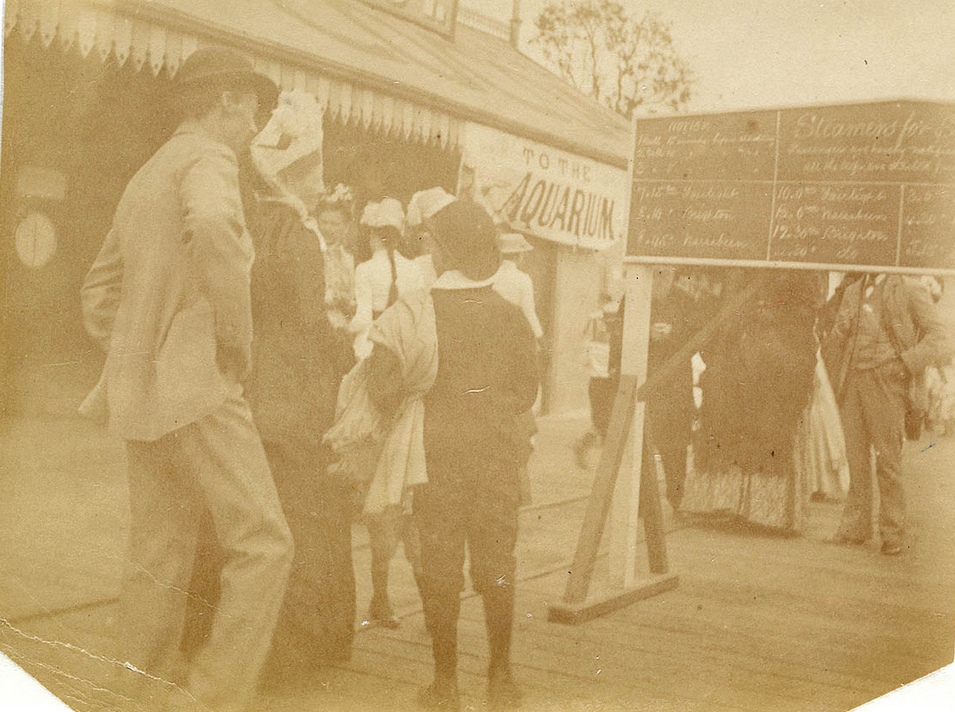
Manly Wharf - circa 1885 -1887
Any planner worth their salt knows to include open spaces and green places in a plan for a village or town or city as it grows - people need to breathe and have a sense of an interconnection between the places they live and the environment they're placed in. People don't like a blank wall when they could have a vista of park, or scurrying down shadowed alleyways when they could have tree lined avenues that stay true to the natural undulations in the land or the smell of salt coming in between the towers. A kinetic connection perhaps, one that is not only soul deep, but proven through numerous scientific studies as well.
What many enjoy now as the great open thoroughfare known as Manly Corso was once a sandy track leading from the wharf on the harbour side to the beach front. A Corso, from the Italian, meaning, (in Italy and some other Mediterranean countries) 'a social promenade' here means a street used for social promenades, or where races and parades were and are formerly held.
In 1882 one of the gentleman elected among Alderman for the first ever Manly Council began to ensure Manly had an open welcoming thoroughfare from harbour to sea and a green open area for sports and community activities, such as the 1892 'Fish Fair':
EARLY DAYS IN MANLY
STORY OF THE CORSO RETOLD BY FORMER ALDERMAN
Mr. C. H. Hayes, senior, of Kenny Hill, Birkley-street, Manly, Is the man to whom "the village" owes two of its best known features— the fine triple row of trees along the sea front, and the well-trodden track to Fairy Bower. In addition Mr. Hayes had his finger in many a municipal pie. He headed the poll at the first municipal election, and was Mayor from 1882 to 1884. His life in the council extended over 17 years. Mr. Hayes, has the keenest appreciation of the generosity and public spirit of , the early residents of Manly. For many years subscriptions and donations for local improvements exceeded the revenue from rates and taxes; and the story of Manly's early progress is no less a story of civic endeavor and patriotism.
The Corso narrowly escaped being a narrow thoroughfare, one-sided, having a vista of back yards opposed to the shop windows. Sir Alexander Stuart, M.L.A., a member of the Ministry, intended to build a wharf well to the south of the present structure, and make Victoria Parade, which is one hundred feet wide, another Corso. This course Mr. Hayes opposed. He approached Mr. J. R. Street, who readily consented to give sufficient land to widen the Corso on the north. On the other side of the street the land was willingly given by the trustees of the Bassett-Darley Estate. There remained the church, whose frontage reached the present line of trees in the centre of the Corso. Plans were drawn up showing the present projection of the ground and the vestry agreed to contract the boundary. In return for this Sir Alexander Stuart gave the church a block of land in Wentworth-street. To finish properly the Improvement Sir Alexander gave £100 towards the cost of planting trees, and as the Government gave, pound for pound there was a good sum in hand for the work.
It was touch and go as to whether Manly had a park or not. There was but one place of suitable ground near the heart, of the municipality. Hearing that it was being subdivided, Mr. Hayes approached the fairy godmother Minister, Sir Alexander Stuart, and pointed out that the ground was so rugged that it built upon it was likely to degenerate into a slum. The Minister empowered Mr. Hayes to make preliminary arrangements for the purchase. The owner put such a prohibitive price upon it that neither gentleman would have anything further to do with the business. The subdivision sale, however did not take place, and an unlucky turn of fortune's wheel compelled the owner to offer the land in one parcel. Again the fairy godmother was invoked, and after some trouble Mr. Hayes was given written authority to buy the land. Though the secret was jealously guarded, another member of the council nosed something in the wind, believing that Mr. Hayes intended to make a profit out of the transaction. Denials were all in vain, but the other persisted, until at length he was assured that if matters were as he thought he would get his share. This clever alderman sat opposite Mr. Hayes at the sale, grimacing happily as a duel went on between two bidders. When the hammer was up for the third and last time Mr. Hayes spoke— for the first and last time. An advance of £50 in the bidding secured for Manly the coveted park— or the lower section of it. The narrator charitably passed over the chagrin of the disappointed alderman. There was still a lion in the path. The property was crossed by two roads, which ended at a big block above it. Having instructed a brother alderman, Mr. Robert Pitt, to secure a three days' option on the block, Mr. Hayes once more sought .the Minister. He pointed out that the price paid for the park was well inside the limit set, and left ample for the purchase of the upper block. If this were secured there would be no need for the streets, which could then be closed, thus giving a large, unbroken area of park land. The Minister agreed, and the whole reserve was purchased for a smaller price than that originally allowed for the southern part. There was a building— an hotel— on it, and for many years it was used as council chambers, the council meeting in the billiard room. The present courthouse is part of the old public house.
Manly Park was now an accomplished fact, but the residents were far from satisfied. It was rough and uneven in the extreme. Sand was carted from the beach, and the filling up process was completed. Over a large portion the depth of sand was 12ft.; and the base of the hotel itself was buried, the sand hiding 13ft. of the structure.
Another feature of early Manly which Mr. Hayes originated, was the world-famous wild flower show held in September of each year. 'This function did a great deal to introduce and popularise Australian wild flowers. But it did more material good. The proceeds of the week's carnival were divided —one half going towards the expense of ' beautifying and Improving the recreation reserve, and the other to help the churches out of debt. Both those objects were, happily, achieved.
Mr. C. H, Hayes EARLY DAYS IN MANLY (1916, July 23).The Sun (Sydney, NSW : 1910 - 1954), , p. 10. Retrieved from http://nla.gov.au/nla.news-article223361532
OLD MANLY.
Mr. Charles Hayes's Reminiscences.
HIS GREAT PIONEERING WORK.
Among the few survivors of the old days In Manly is Mr. Charles Hayes, well known to the Australian mining and commercial world as secretary to the Sydney Royal Exchange, which position he filled with credit to himself and advantage to the investing community for over 30 years, retiring only a couple of years ago.
Mr. Hayes's connection with Manly goes back nearly half a century. He recollects the "Village" in its very Infancy, being one of its earliest residents. Whenhe was Mayor in 1882 he made a presentation of the handsome granite column of lamps that adorns the triangle facing the Town Hall.This was to commemorate the incorporation of the municipality in 1877. He was a member of the council from its inception, and was Mayor in 1882 and 1883, during which terms of office much was accomplished in the way of tree planting and securing parks and reserves for the people.
Between 50 and 60 years ago a good deal of tree planting had been done on the Ocean Beach and Esplanade, through the wisdom and farseeing policy of old pioneers like Messrs. Gilbert Smith, John Woods, Henry Austin, and Robert Pitt. The benefits these grand old men of the bygone days accomplished for Manly are unknown except to a few of the present generation. To the memory of Mr. Gilbert Smith, who was Manly's greatest benefactor, some tribute of grateful remembrance is specially due. Most people think that the rows of stately Norfolk pines which form the present avenues along the beach and Esplanade came into existence together, but that is not so. The planting of the pines was the work of different years, and different men. It was a gradual growth, but Manly's oldest inhabitant, Mr. Edward Badmington, who is happily in good health despite his 84 years, can claim to have planted the very first trees 55 years ago, under the direction of Mr. Smith, by whom he was employed. Nothing, however, had been done at the southern end of the Ocean Beach till 1882, when Mr. Hayes assumed office as Mayor. Then the trees were planted at the South Steyne, and the whole avenues to near the lagoon planted uniformly, and shaped to their present-day perfection. This fine work was carried out under the supervision of the late veteran Alderman Adam Russell, who was then municipal overseer for works. So to Mr. Hayes, and the gentlemen associated with him, the credit of giving the final touches to the grand scheme of tree-planting, which is Manly's chief glory on land, is to be credited.
It will come as news to many to hear that the Corso was once nearly relegated to the status of a back street. The southern side of the Corso comprised the Bassett-Darley Estate, and Victoria-parade was laid out to become Manly's main highway from the harbor to the sea. But Mr. Hayes, with others, fought for the supremacy of the Corso which was then practically only a narrow pathway extending in width from the northern side to the trees now standing in the middle of the present street. The trustees of the Bassett-Darley Estate were induced to give sufficient land to make the thoroughfare 66ft. wide. The St. Matthew's Church authorities also allowed the street to go back on their land. For the concession the church people were handsomely compensated by the trustees of the Bassett-Darley Estate by the gift of a valuable block of land In Wentworth-street. The church building, of course, remained, and its abutment on the Corso has been a source of continual strife between council and church ever since. After nearly 30 years of resultless negotiations a settlement of the trouble is now apparently hand, and the obstruction, which spoils continuity of the Corso and blocks its progress is soon likely to disappear. Mr. Hayes chats interestingly, about old times in Manly. A lot of what he has to say should be read by present-day Manlyites, learn what was accomplished, by the bygone pioneers, and how little has been done for nearly 30 years, until the recent progressive period, which started with the advent of, all say, surf-bathing several years ago.
The first steamer Mr. Hayes recollects running regularly to Manly was the Phantom, in 1872. Then came the Fairlight and the Emu. The last named boat was renamed the Brightside and up till recently did duty as a cargo carrier. In its early life the Emu was the steamer which carried Queensland legislators to Brisbane from many ports, and great stories are told of the wild revelries that were held in her cabins by the old-time northern parliamentarians. There was no Manly boat after 5 p.m. 40 years ago, and whenever the residents wished to visit the city theatres they had to arrange amongst themselves for a sufficient number of passenger's, and give a guarantee. High spirits and jollity prevailed among the Manly folk on the homely journeyings. Each one on board knew the other, and often the home-comings were even more enjoyable than the theatres. Refreshments of all kinds were available on the steamer, and the men had a popular institution during the cold winter nights in the shape of a "Hot Potato Club." These plain and comforting articles of diet were served up by the men on the boat, and with sausages, hot pies, and the like, were always relished by the male passengers. Of course, a good stock of spirits and beer was always on hand.
"If Charley Hayes had done nothing more for Manly than securing the Manly Oval for the people, his name deserves to be kept a warm remembrance!" These words were spoken by Mr. J. J. Lough, himself an old worker for Manly's progress, and Mayor nearly 30 years ago. Mr. Hayes was disinclined to speak of his fine accomplishment when approached on the subject. To his wisdom and foresight, however, the acquisition of the park is to be completely credited.
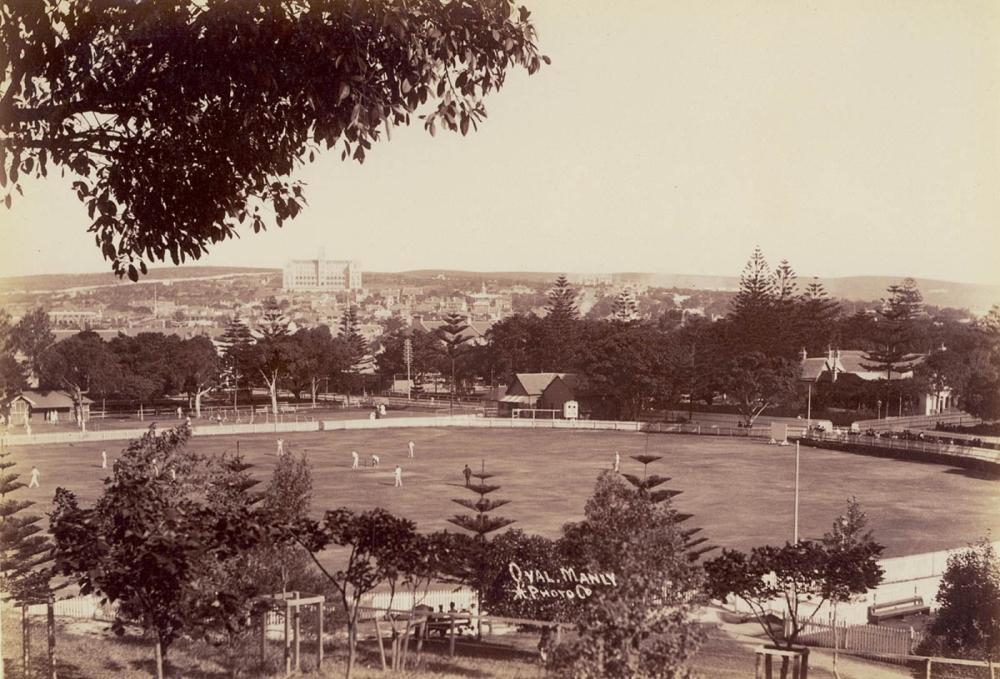
Oval, Manly [with cricket match in progress] circa 1900-1910, Image No. a116271, courtesy State Library of NSW
The site of the present cricket ground, with the tennis court, and courthouse, formed the property of the late Mr. T. Adrian, who ran a hotel, the Ivanhoe, and a sports enclosure, to which great crowds came every holiday. The courthouse occupies the site of the old hotel, and the cellars still exist. In the centre of the ground was a lagoon, several feet deep, from which there was a watercourse right on to the harbor esplanade, alongside the present wharf. Mr. Hayes states that he was always anxious to secure the land for a public Recreation reserve, and he requested the then Premier (Mr. Stuart) to purchase it for the people. The Premier would not act directly, but informed Mr. Hayes that he might approach the owner, without disclosing the purpose for which the ground was intended, and see what he would take for it. Mr. Hayes did so but the price asked was prohibitive. Later, the property came up for sale by the mortgagee, and Mr. Hayes quietly secured it by purchase, at a sum considerably below what the owner had previously wanted for it. Mr. Stuart afterwards voted the money to Mr. Hayes, who, in the meantime, could have realised handsomely on his bargain.
The locality of the bowling green and the surrounding hills of the present park were not, however, included in this purchase. This territory belonged to Mr. J. Rowe, and Mr. Hayes purchased it on his own responsibility, which action was also ratified by Premier Stuart later on. These two wise deals by Mr. Hayes secured a fine heritage for the people of Manly and the visiting public, in the shape of one of the prettiest recreation grounds in Australia.
The Manly wildflower shows in their day were things of joy and beauty, and a great attraction for visitors. The first show was originated by Mr. Hayes, along with the Rev. T. Willis, while the former was Mayor, Mrs. Hayes and other ladies joined heartily in the scheme, which was to raise funds for St. Matthew's Church, and afford an advertisement for Manly. Willing volunteers gathered in the wildflowers, which were then abundant all round Manly, and the initial function was' an astonishing and gratifying success. Mrs. Hayes states that over £250 was taken by the ladies in the first two hours of the festival of flowers. Each succeeding year the shows grew in importance, and attracted thousands of visitors from the city. The Manly Wildflower Show became a yearly event for the whole of Sydney, and was a fine advertisement for the place. Thousands of pounds were raised, which went to helping the different churches, who took half the proceeds, while the council received the other for the Improvement of the reserves. It was from the money gathered from the flowers that the oval was filled In and brought up to its present satisfactory condition, and many other park improvements were made from the funds. With the increasing scarcity of wildflowers the flower shows died out, after nearly a dozen years of existence. OLD MANLY. (1912, April 28). The Sun (Sydney, NSW : 1910 - 1954), , p. 11. Retrieved , from http://nla.gov.au/nla.news-article228857438
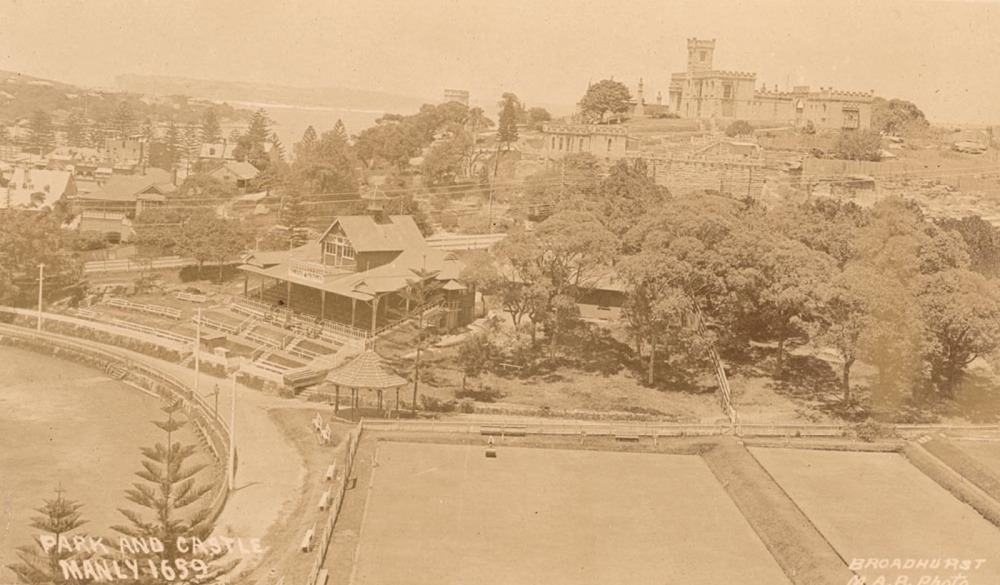
Park and Castle, Manly, circa 1900-1927, from Album: Scenes of Manly, N.S.W., Sydney & Ashfield : Broadhurst Post Card Publishers. Image No.: a105559, courtesy State Library of NSW
CRICKET GROUND THAT HAS BEEN UNDER THE PLOUGH
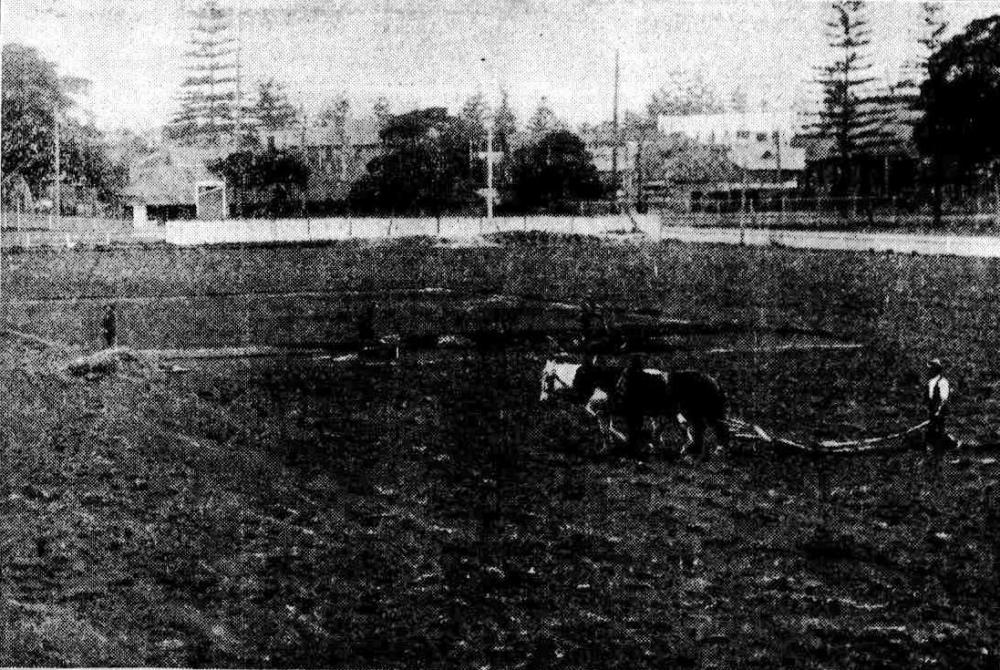
This is not a corner of a farm in the wheat belt. The picture shows the Manly Oval as it is to-day, after it has been ploughed and harrowed in order to get rid- of the Parramatta grass which was making the outfield unplayable. The Bulli patch in the centre has been left undisturbed except by top dressing. It is hoped that the ground will be fit to play in five or six weeks. CRICKET GROUND THAT HAS BEEN UNDER THE PLOUGH (1921, September 28). The Sun (Sydney, NSW : 1910 - 1954), , p. 1 (FINAL RACING). Retrieved from http://nla.gov.au/nla.news-article224142045
Progress always attracts the progressive - anyone who loves those wonderful facades we see in the Arlington Amusement hall at Collaroy and still extant in Manly Corso
(Thomas Rowe)
New Shops at Manly.
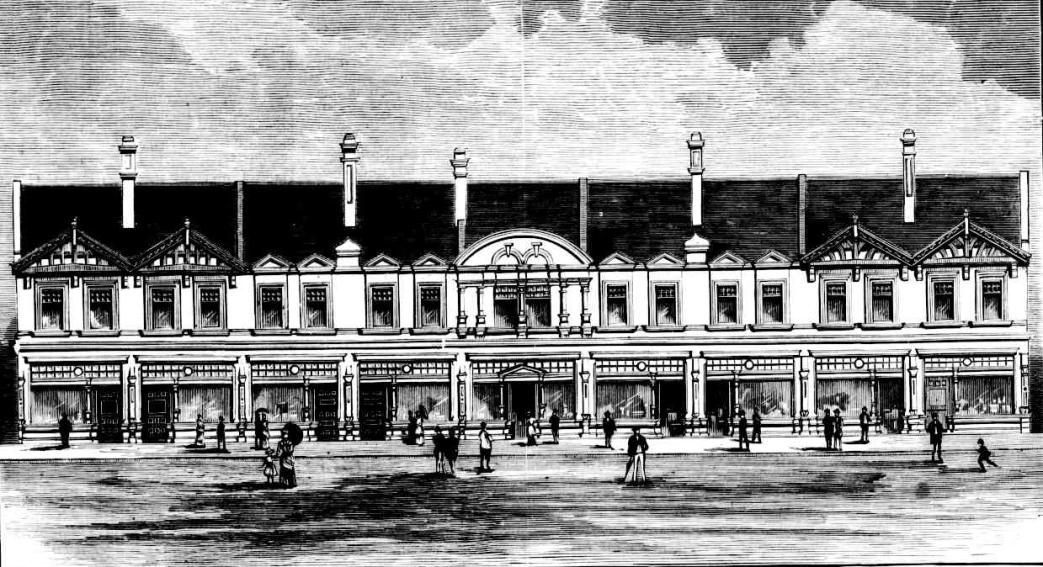
SHOPS IN COURSE OF ERECTION BY THE ANGLO-AUSTRALIAN M. L. & F. COMPANY, AT MANLY.
THIS block of shops is being erected for the Anglo-Australian Land, Finance, and Investment Co., Limited, of Sydney, in the main thoroughfare of Manly, having been designed by Messrs Loweish and Moorhouse, architects, of Bond Street, Sydney, and, when completed, will form quite a new feature in the street architecture of this rapidly improving sea-side resort. The style of architecture adapted is classic, of a free treatment.
The fronts are of Manly free-stone, and broken up to relieve the monotonous feeling which usually exists in a row of shops of this kind-half-timbered gables surmounting the two shops at each end. The mouldings are of a very high character, and calculated to give an air of refinement to the structure, and thereby stamp it as property of a very high order. The small squares in the shop windows, also the upper story windows, will be filled in with bevelled plate glass, giving a charmingly rich effect. Each shop will have attached to it a convenient suite of living-rooms, &c , at the rear. This firm of architects, who have settled in our midst, are recently from England, where they have studied and practised their art in the first offices of the mother country. They are endeavouring to improve our street architecture, which, however, has not been neglected, notwithstanding that there is still room for improvement. This, their first essay at Manly, certainly does them no discredit. We may hope to see other buildings from their designs at an early date.
New Shops at Manly. (1886, March 15).Illustrated Sydney News (NSW : 1881 - 1894), , p. 20. Retrieved from http://nla.gov.au/nla.news-article63620018
Destructive Fire at Manly.
(Thursday's Echo.)
At about a quarter to 11 o'clock last evening a fire broke out in the premises owned by Mr. Sargent, in the Corso, Manly, consisting of three weatherboard shops. Only one of the shops was occupied at the time of the outbreak, the tenant being James Thompson, tobacconist. The Manly Volunteer Fire Company turned out with two manuals, in response to the alarm given by the citizens, and put forth great efforts to subdue the flames. It soon appeared evident that the three shops were doomed, and the efforts of the firemen were chiefly devoted to saving the adjoining buildings. On the southerly side of the burning buildings were the premises of Mr. Picard, photographer and dealer, and on the northerly side was the Manly Aquarium. A large crowd had collected at the scene of the conflagration, and many of those present lent valuable assistance to the firemen to prevent as far as possible the further spread of the flames. As may be imagined, there was considerable difficulty in obtaining water in sufficient quantities. The firemen, however, burstinto the Aquarium and ripped up the floor of the main hall, and there from two water-tanks, each holding about 60,000 gallons of water, one of the manuals was made to work with great effect. The other manual pumped water from the harbour. The firemen were unable to do more, however, than save the Aquarium and Mr. Picard's shop, the three weatherboard buildings being entirely burned out, and reduced to ruins, and it was not until nearly two o'clock that the flames were thoroughly extinguished. The Aqua-rium was burned chiefly inside of the building, and damaged by water, the lower shop was badly burned, and all the plate-glass of the shop was completely broken ; Mr. Picard's shop was also considerably damaged by fire, and the total damage is estimated at between £3000 and £4000. The following ¡B the insurance on the buildings :-The Aquarium was insured for a total sum of £10,500, viz., in the Queen Insurance Company for £4000, Mercantile Mutual .£3500, and Commercial Union .£3000. Mr. Picard's premises, we are informed, were not insured. The weatherboard shops where the fire is supposed to have originated were insured for £850 in the Mercantile Mutual Company, and the contents of Mr. Thompson's shop were insured in the Union Company of New Zealand for £100. Destructive Fire at Manly. (1887, August 20). The Maitland Mercury and Hunter River General Advertiser (NSW : 1843 - 1893), , p. 16 (Second Sheet to Maitland Mercury). Retrieved from http://nla.gov.au/nla.news-article18887456
Attracting People to Manly
Once called the 'Brighton of the South'
Fisheries Fair at Manly.
Manly is in a state of excitement over the novelty in the way of shows which the ladies of the neighborhood are arranging in aid of the funds of the local Anglican church. The show is to take the form of a fisheries fair, which will be held in the pavilion in Ivanhoe Park. The opening ceremony will be performed on Tuesday, November 8, by Mrs. Sydney Burdekin.
For the time being the usually sombre-looking pavilion will be converted into a veritable sea of boats set in full sail. The time-honored orthodox stalls will give place to a fleet of ships laden with plain and fancy work, the fruits of the labors of the ladies and friends of St. Matthew's Church. The arrangements are being carried out under the supervision of the hon. secretary, Mrs. W. H. Pinhey; and there is no doubt that, given propitious weather, the fair will be a decided success.
The exhibition will be a large and varied one, and is of an eminently interesting character. Nos. 1, 2, and 3 boats wil1 be presided over by Mesdames George, Smith, Anslow, S. C. Sadler, assisted by Misses Tibbets and Tighe, attired in the costume of Pechesses de Boulogne. A boat laden with sweetmeats will be in charge of Mesdames David and Thomas, assisted by Messrs. Heatherington, Salmon, and Thompson, attired in the costume of Neapolitan Fishwives. Another boat will be in charge of Mesdames W. H. Pinhey and H. Prince, assisted by Madame Rossiter and Miss F. Rawson. At this stall Miss Rosina Pinhey will he attired as Grace Darling. A boat for plain sewing will be in charge of Madame Willis, assisted by Madame Dimelow and Misses H. Willis, V. Willis, and Winifred Ounther, dressed as Cattarese Fishwives. Miss Payn, assisted by Misses Wilkinson, Elphinstone, and Farquhar, will be attired as Newhaven fishwives, and have charge of a boat for fancy work.
A canoe, 'The Fishpond,' is in charge of a crew of Norwegian fishwives, represented by Madame R. H. Adams, assisted by Miss Adams. A Brittany tea barge will be in charge of Madame Owen and Miss Rolfe, assisted by Misses Willgoss and Trevor,' attired as Pechesses de Bretagne. Another boat for the sale of fish and exhibiting the various Australian piscatorial specimens will be manned by Messrs. H. Prince, Towns, and S. C. Sadler. The picture gallery will be in charge of Madame Kermode, while the mystery and art of palmistry, an additional attraction, will be in charge of Miss Henri.
The fernery will, in the evenings, be lighted up with fairy lamps of varied colors. In a pretty little park will be situated the waxworks show in charge of Mesdames Jarley and S. C. Watkins, while in the may pole tent a dance of that name will be conducted under Madame Mostyn Hawkes, the little girls being prettily attired in Gondolieri and Contadini costumes, while the boys will be dressed as Neapolitan Fishermen.
A feature of the show will be a table decoration, entries for which close on the 1st proximo, and in which, the use of mirrors, dessert service, and fruit will be disallowed.A prize will also be offered for the best arranged basket of garden flowers, and there will be a doll competition. The prizes for the doll competition close on the 5th proximo. The judges in the table decorations are Lady Innes, Mrs. Augustus Morris, Mrs., Gilgour, Mrs. Calvert, and Mrs. Paterson; while in the doll competition Mrs. E. Barton, Mrs. T. W. Lyne, Mrs. H. E. Russell, Mrs. Littlejohn, and Miss Belisario will be the judges. Dr. Monsignor Verdon has kindly let the platform without any charge for the use of the wax works, Mr. Roffe, Goulburn-street, has offered to put up all posters gratuitously, and Messers Hollander and Govett, Chisholm-lane have kindly offered their aid gratuitously. The Wollongong Town Band will be in attendance at the fair, which will be opened daily at 2.30 in the afternoon, with the exception of Wednesday, the holiday, when the fair will open from 11.30 in the morning. Fisheries Fair at Manly. (1892, October 31). Evening News (Sydney, NSW : 1869 - 1931), , p. 5. Retrieved fromhttp://nla.gov.au/nla.news-article113315647
The "Fisheries" at Manly.
On Tuesday last the Fisheries Fair was opened at Manly for the purpose of raising money to assist in reducing the debt on St. Matthew's Church. The idea was a novel one, and carried out in a thoroughly artistic manner, the articles on sale and exhibition being displayed in and about boats. The Fair was declared open by Mrs. Burdekin, who was escorted to the pavilion by several of the officers of St. Matthew's Church.
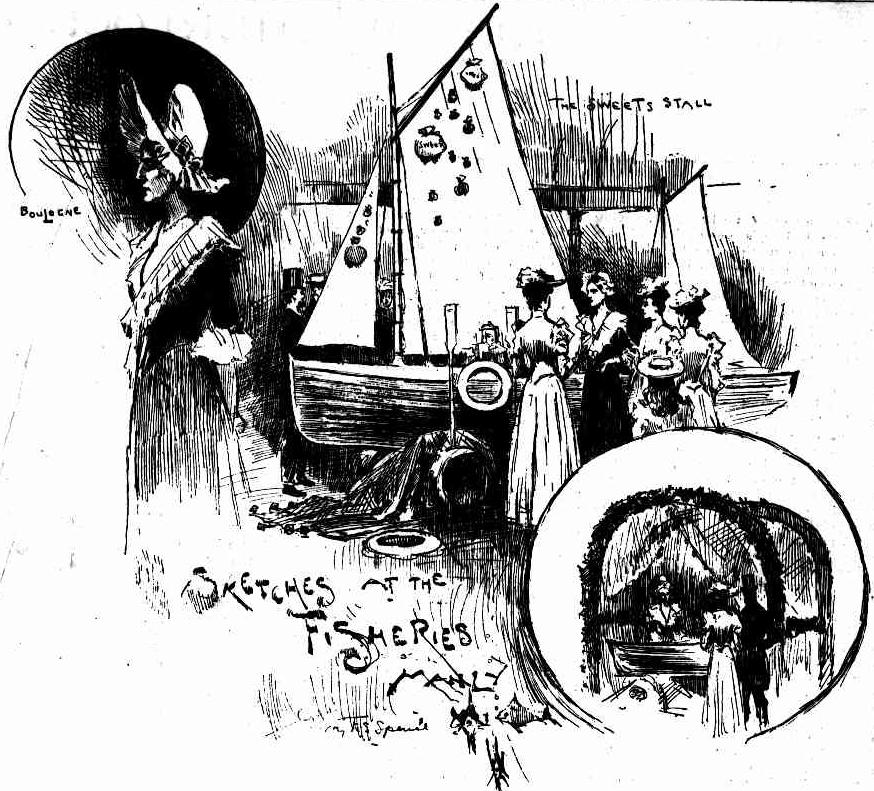
All sorts of boats were utilised, from the rowing skiff to the felucca, and the attendants were tastefully arrayed in costumes' suitable to the nationalities they represented. The arrangement of the various crafts were as follows : - Boats for fancy work, preserves and dolls (three) : Boulogne fishwives, Mrs. George Smith, Mrs. Anslow, Mrs. S. C. Sadler ; assistants, Mrs. Holt and Miss Tibbits. Boats for sweetmeats: Neapolitan fishwives, Mrs. David Thomas ; assistants, Miss Hetherington, Miss Salmon, Miss Thompson. Boat for fruit and flowers: Normandy fish-wives, Mrs. W. H. Pinhey (hon. secretary), Mrs. H. Prince ; assistants, Mrs. Rossiter, Miss F. Rawson, and Miss Rosina Pinhey (the latter dressed up as the immortal Grace Darling). Boat for plain sewing : Cattanese fishwives, Mrs. R. S. Willis (hon. treasurer); assistants, Mrs. Dimelow, Misses H. and V. Willis, Miss Winifred Gunther, and Miss K. Doyle. Boat for fancy work : Newhaven fishwives, Miss Payn ; assistants, Miss Wilkinson, Miss Elphinstone, Miss Farquhar, and Miss Broad. Canoe, " The Fishpond " : Norwegian fishwives, Mrs. R. H. Adams ; assistants, the Misses Adams (including Miss Queenie Adams, the " little shrimper". Brittany tea barge : Brittany fishwives, Mrs. Owen, Miss Rolfe ; assistants, Miss Willgoss and Miss Trevor, Boat for fish, Messrs. Prince, Towns, and Sadler.
Besides the fair proper, there is an exhibition of living waxworks (the " Mrs. Jarley " being Mrs. S. C. Watkins), a Christmas tree, in charge , of Miss Isabel Adams ; a spinning jenny, guarded by Mrs. Dimelow ; a picture gallery, of which the custodian and trustee is Mrs. Kermode ; and a Maypole tent.
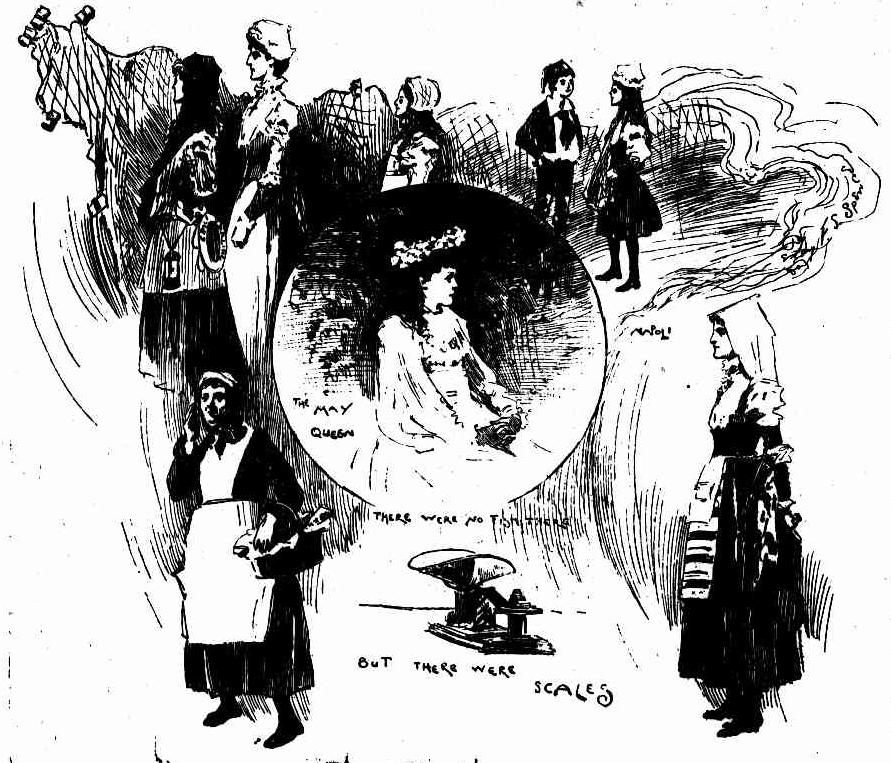
The Maypole dance is danced by a dozen girls and boys, who have been instructed by Mrs. Mostyn Hawkes. These young people are dressed in brightest gondolieri and cantadini costumes, and as they dance very well, the Maypole tent should prove not one of the least attractions of the fair. The May Queen-by day is Miss Leila Prince, a wee dot of four or five years of age, and the night Queen Miss Hayes. The fair remained open until to-day, and a large profit is expected when the accounts; are finally made up.
The "Fisheries" at Manly. (1892, November 12). Illustrated Sydney News (NSW : 1881 - 1894), , p. 11. Retrieved from http://nla.gov.au/nla.news-article64031790
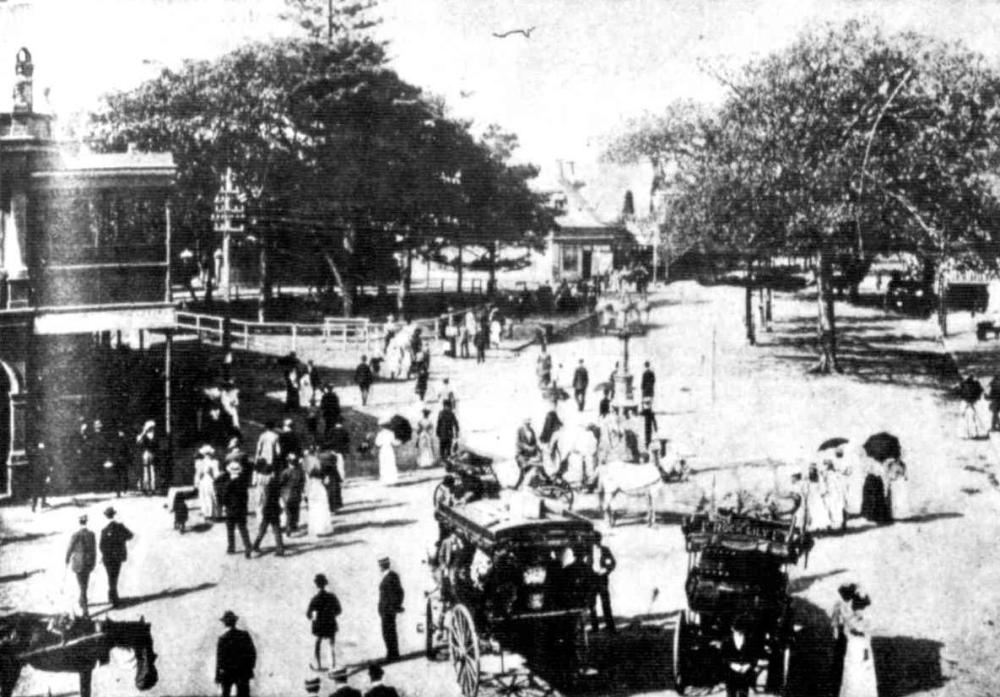
LOOKING DOWN THE CORSO, MANLY. LOOKING DOWN THE CORSO, MANLY. (1898, November 26). The Australasian (Melbourne, Vic. : 1864 - 1946), , p. 29. Retrieved from http://nla.gov.au/nla.news-article138668638
MANLY-THE QUEEN OF AUSTRALIAN WATERING PLACES
(PHOTOS BY F. LEE, WOOLLAHRA.)
(SEE ILLUSTRATIONS ON THIS PAGE AND PAGES 31, 32, 33, 34, and 35.)
VIEWS ON THE BEACHES.
Manly is to Sydney what Brighton is to London -the people's watering place. It is the resort par excellence of holiday-makers. On New Year's Day-or, more correctly, January 2, for the year .opened on Sunday-the five steamers of the Port Jackson Co-operative Company carried, exclusive of season ticket holders, no less than 22,000 people to the deservedly popular suburb. Not only is Manly the objective point of pleasure seekers at holiday times, but all through the summer season it is visited by hundreds, sometimes thousands, daily. A more ideal place for family picnics would be hard to find. Juveniles delight in the magnificent ocean and harbor beaches, the merry-go-rounds, the splendid baths, the fishing, the rambles by rocky glens and fairy bowers, and other attractions which make up the sum total of a day's outing at Manly. Young ladles, while their male acquaintances are at work in the city, slip down there for afternoon tea and gossip, and in the evening, when the labor of the day is over, a "blow" on the harbor, and a walk on the ocean promenade with sweetheart, wife, or sister, has become al-most as much a part of the city denizen's existence as his pipe or newspaper. As the recreation haunt of the metropolis, Manly has steadily and satisfactorily in-creased its attractions, considering our somewhat tardy recognition of its advantages and possibilities. A good band is badly wanted, or, for the matter of that, two bands, one for the (harbor) Esplanade, and another for the (ocean) Parade. Occasionally the Port Jackson Company secure the services of a band for the Esplanade, and the popularity which attends these performances points to the desirability of establishing the band as a permanent institution.
Though it is only with-in the last three or four years that Manly has come to be known and appreciated at its proper worth, the now more than village has been growing nearly half a century. There are still one or two Manlyites who remembered the narrow isthmus which connect North Head with the mainland as a scrubby waste with rude tracks leading here and there to the ten or twelve, cottage residences, where lived as many families, the sole population of the neighborhood forty odd years ago. Mr. Henry Gilbert Smith, the proprietor of the estate, had a house on the hill where now stands Dalley's "Castle," or "Folly," as the unfinished pile has been called, and of the other residents one or two were "something in the city," and the remainder were mostly
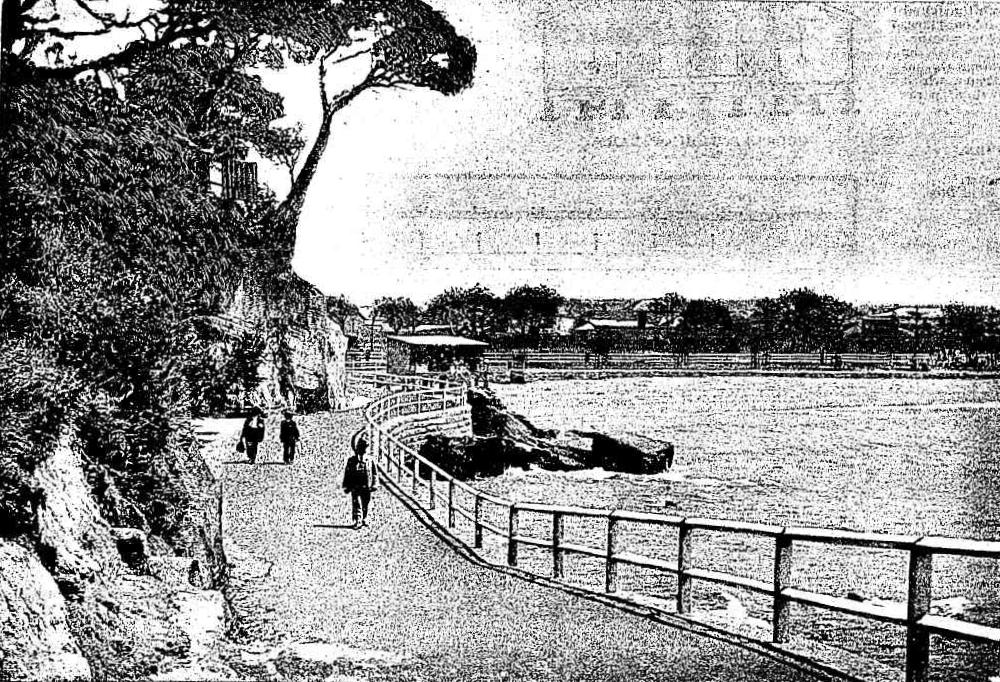
OCEAN PARADE, MANLY.
fishermen. Communication with the city was maintained by the Parramatta steamers, which plied from the wharf at the foot of Erskine-street, and made two trips a day in fine weather, and whenever was convenient-perhaps but one trip a week in bad weather. A return fare then cost 3s. The steamers of those days were the Victoria, Black Swan, Pelican; and Emu, comparatively small craft, but capable of covering the distance-something over seven miles-in three quarters of an hour. To-day we have those fine saloon steamers Brighton, Manly, Fairlight, Narrabeen, and Brightside, which make the run a slightly shorter one certainly, in 35 minutes (the Manly does it in 25), and are together capable of transporting with, comfort 5000 people in one trip, or an average of 1000 per steamer. Instead of the two trips a day there are now twenty-seven from each end, and fair weather or foul the service is maintained with the regularity of the English mail. Such a service as this, such fine steamers, and such cheap fares, is unexcelled anywhere.
LOOKING OUT TO SEA.
In other respects also great strides have been made. The little fishing village has become, perhaps, the most picturesque watering place on the Australian seaboard. Nature has done nearly everything for Manly. The residents have done the rest. They built the Corso, the main thoroughfare connecting the harbor beach with that of the ocean, and as population grew, cut up the land on either side into residential blocks, planted shady trees by the way-side, created a park and recreation reserve, constructed the Esplanade, and defined the Ocean Parade, the completion of which the local council will, doubtless, leave as a legacy to a future generation of aldermen. More might have been done but for the circumstance that the Municipality of Manly, like most similar bodies in this country, finds itself hampered by monetary considerations.
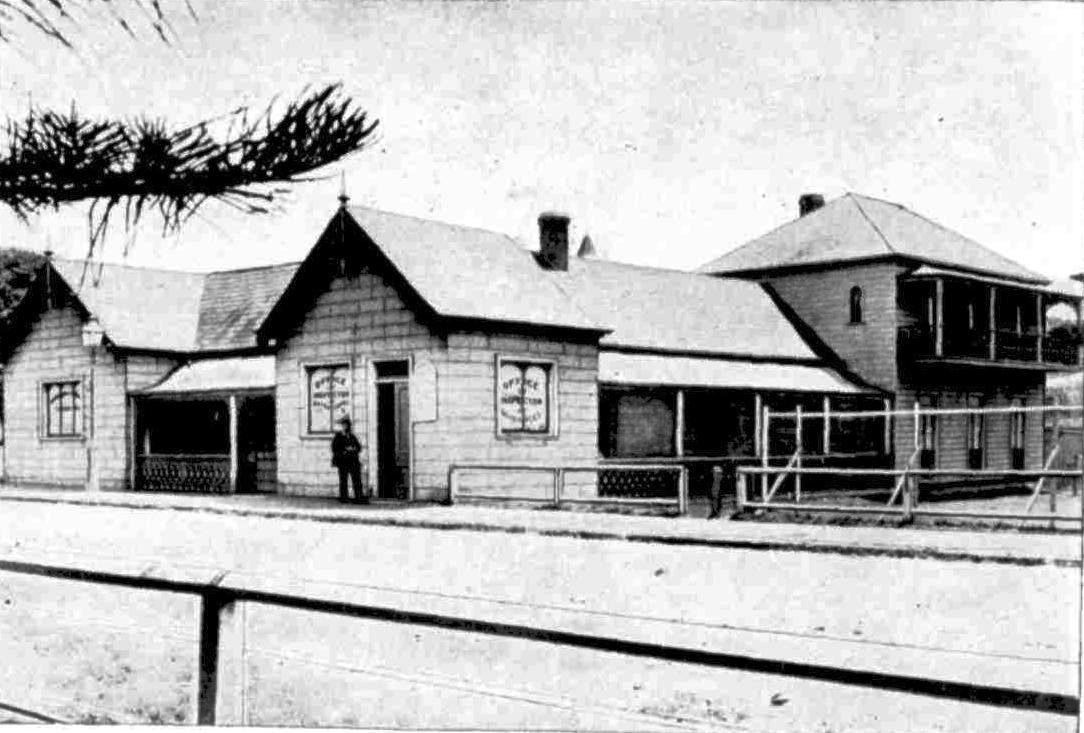
THE COUNCIL CHAMBERS.
The village had grown in-to a township, but the atmosphere of the village still clung round it. Manly was at best a dead and alive sort of place. Families who could afford, it sojourned there during the summer months, but the eighteen penny fare which obtained was not caluculated to encourage permanent residents, and even the holiday fare of 1s seldom brought more than a few thousand visitors on any single occasion. A stimulus was wanting to galvanise the place into activity, and it came two or three years ago, when a number of influential residents, failing to se-cure a reduction in fares from the Port Jackson Company, organised, and ran an opposition line of steamers, at the ridiculously low rate of 3d. The competition which ensued was keen and suicidal, but "all's well that ends well," and Manly, as the saying is, has never looked back since. The great public having once tasted of the joys of a trip to Manly, must needs go again, and often, so by and bye, the rival companies amalgamated, a sixpenny return fare was established, andwhere, in 1893, the number of visitors was 376,777, the number in 1898 reached the grand total (exclusive of season ticket holders-a very numerous class, of course), 1,145,872-more than three times the number carried at the 1s 6d rate. Scores of new houses have been erected to meet growing demands, and from 3500 the population has increased to nearly 7000.
MANLY-THE QUEEN OF AUSTRALIAN WATERING PLACES.
(PHOTOS. BY F. LEE, WOOLLAHRA.)
Under this new stimulus business, of course, went ahead by leaps and. bounds. Not a few shop-keepers found it necessary to rebuild, and extend their premises. Mr. J. W. Purves was one of these. He is the leading baker of Manly, and his refreshment-room at the Esplanade end of the Corso beats anything to be seen in Sydney for comfort, convenience, and general up-to-dateness. No wonder, for it cost him £2000 to build it. The floor is beautifully tiled, the ceiling is of the kind known as "Wunderlich," and the furnishings and fittings are of modern type. What is more to the point, the confections, etc., are of the best quality, and as there are six waitresses in constant attendance, patrons are spared those trials of temper which invariably arise from "having to wait." Mr. Purves's establishment seats 80 people comfortably, and by utilising the balcony, he can accommodate 200. Not very long ago Mr. Purves had the satisfaction of seeing the Premier (Mr. Reid), and the Colonial Secretary (Mr. Brunker), sitting in his shop, enjoying a cup bf tea "on their own."
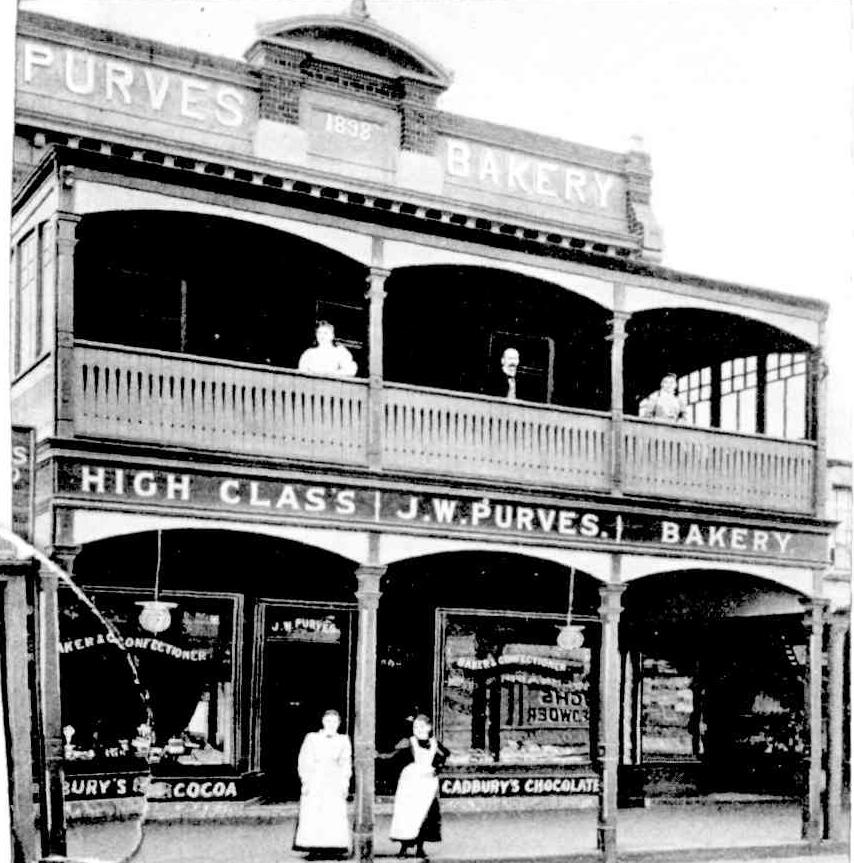
MR. J. W. PURVES'S BAKERY.
A little further along the Corso is the establishment of Mr. Charles J. Carroll, who, as chemist and druggist, has built up a large connection during the three years he has been in business. This is the same Mr. Carroll whose "Instantaneous Headache Cure" has afforded relief to numbers of suffering humanity. Apart from his profession of chemist and druggist. Mr. Carroll is a skilled surgical and mechanical dentist, and residents can have their teeth attended to on terms as advantageous as can be obtained in the city.
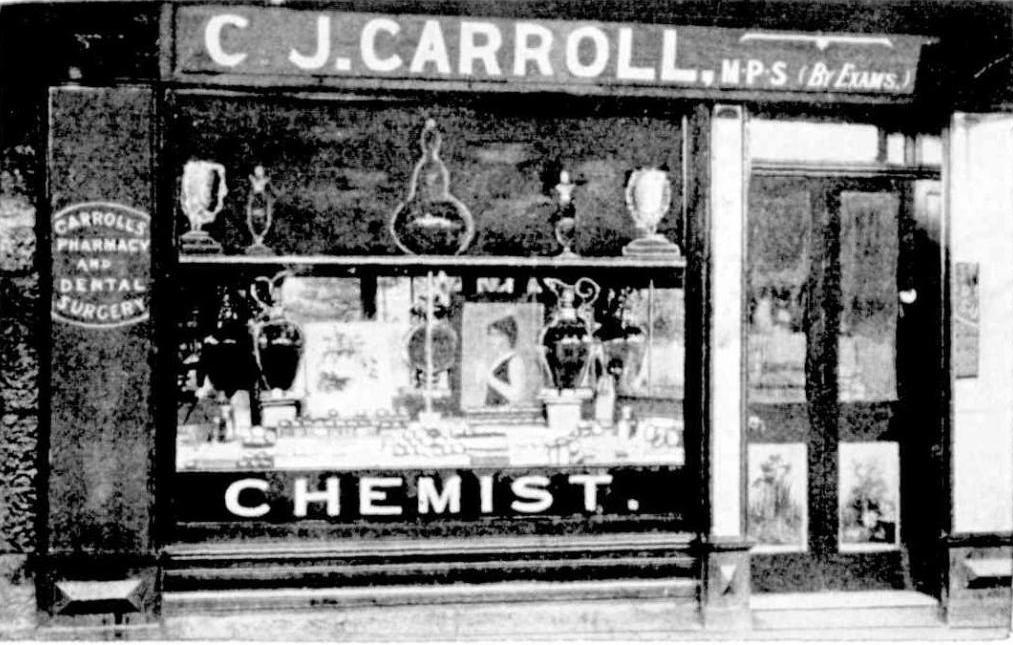
C. J. CARROLL'S PHARMACY AND DENTAL SURGERY.
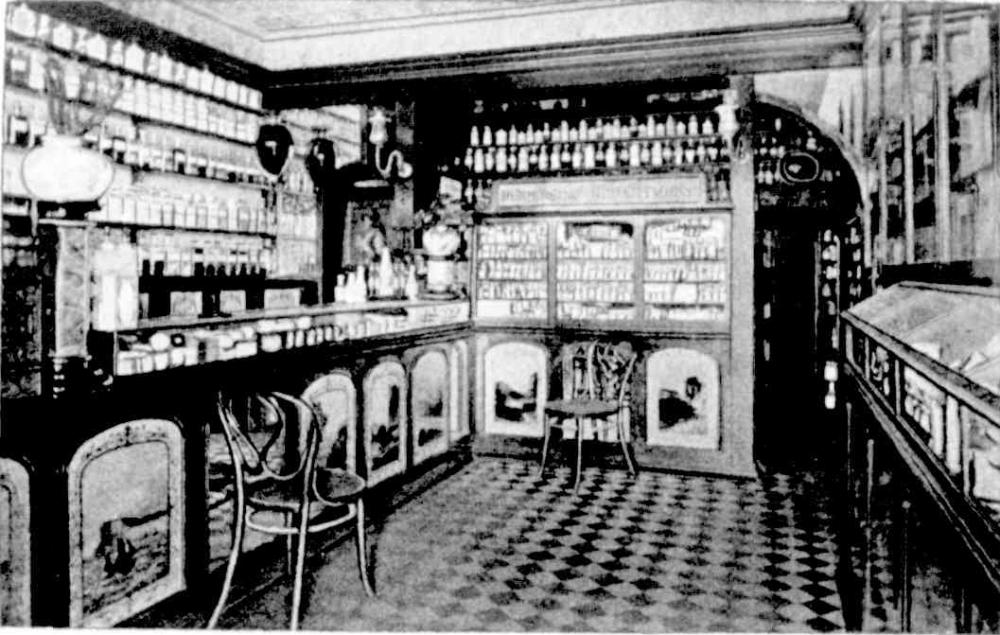
INTERIOR VIEW OF MR. C. J. CARROLL'S BUSINESS PREMISES.
The "Universal Providers" of Manly is a distinction enjoyed by Messrs. Butler Brothers, who, seven years ago, took over the business of Mr. Stephen Sullivan, and have since extended it so as to embrace all the needs of the town. A list of the things they sell would make tedious reading, but roughly, they may be summed up under the several heads of groceries, provisions, wines and spirits, produce, hardware, ironmongery, paints and oils, bedding, furniture, and building material. Tea blending is made a specialty of, and the Butler Brothers' brands have many appreciative consumers.
Another well-appointed tea-room is that of Mrs. Frances Young, which is situated at the corner of the Corso and the Ocean or Steyne Parade-the best and most admirable site in all Manly. The building is quite new-it was only opened by Mrs. Young on Christmas Eve-and it is replete with modern conveniences. Here visitors may sit and sip their tea and look out upon the great ocean, and listen to the music of the waves, as they break upon the beach a few yards away. What further recommendation is necessary? Unless it be that the catering is excellent, and the attendance first-class.
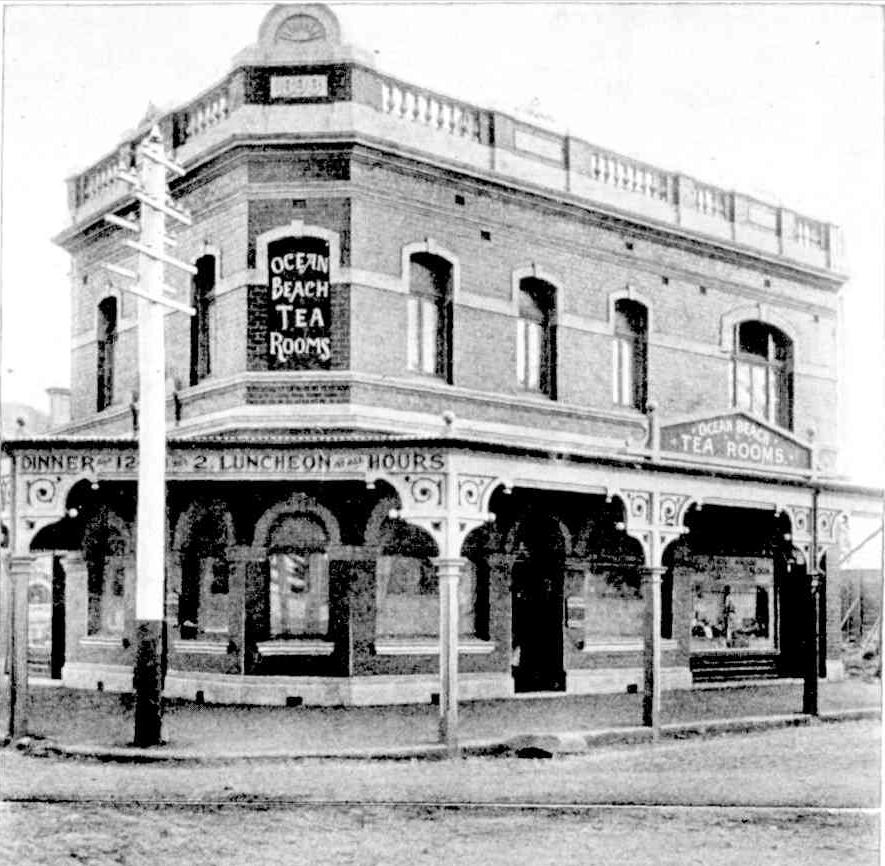
MRS. YOUNG'S OCEAN BEACH TEA ROOMS.
In the matter of educational advantages Manly is ahead of most suburbs. The University College, conducted by Mr. John F. M'Manamey, B.A., Syd. (gold medallist in classics), with competent assist-ant masters, though only twelve months founded, has become one of the institutions of the district. It is both a boarding and a day school. The curriculum includes preparation for the examinations of the University and of the Public Service Board. Special instruction is given in shorthand and type-writing, and, of course, adequate provision is made for recreation, in the shape of sports clubs, with the additional advantage of a cadet corp for drill and discipline.
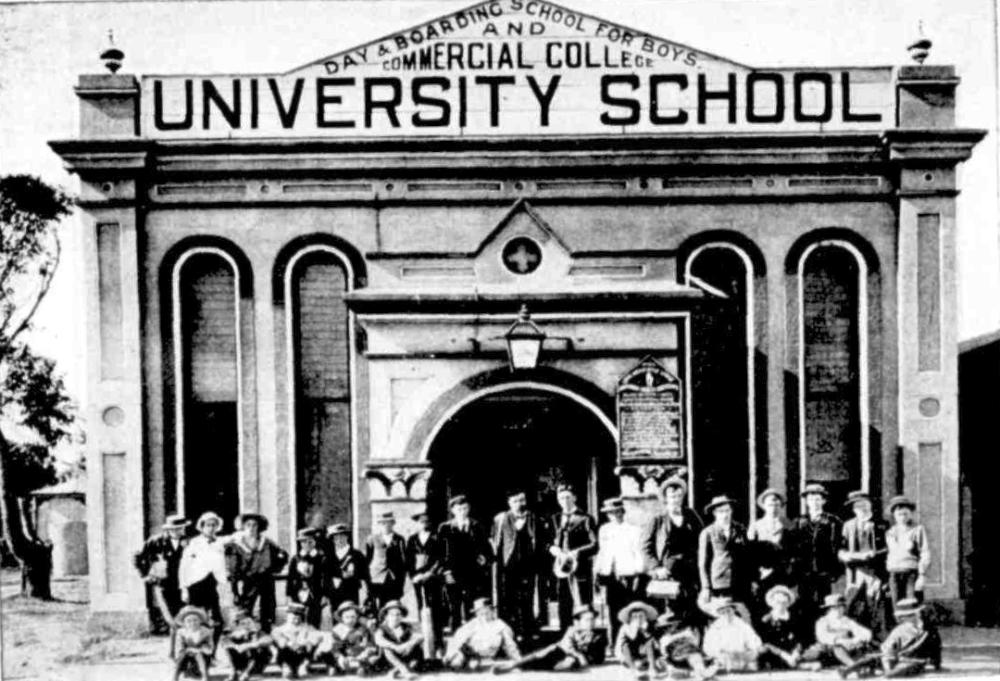
UNIVERSITY SCHOOL.
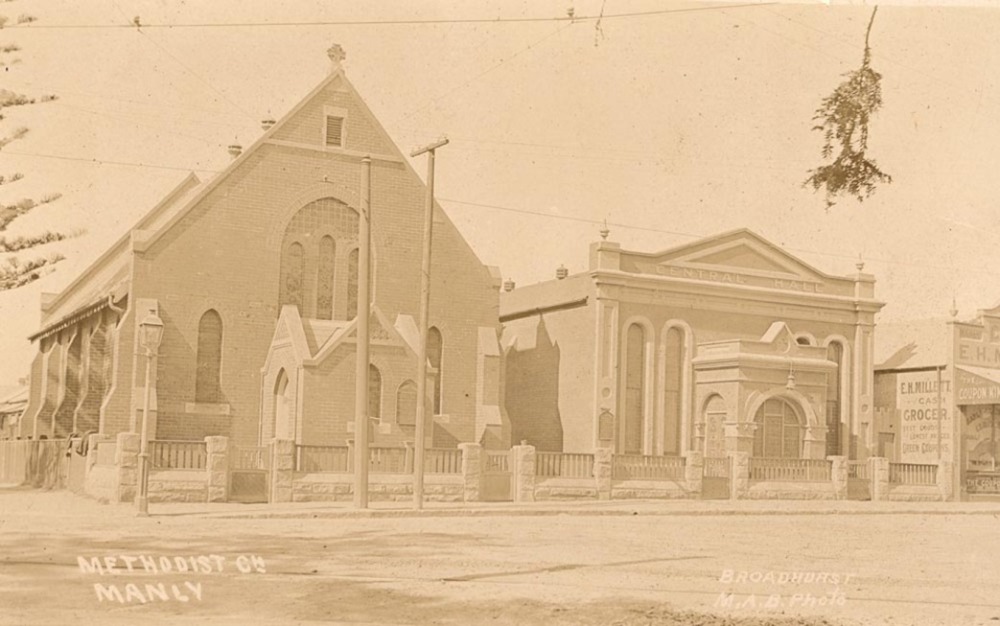
The same building beside 'Methodist church', now the 'Central Hall' circa 1900-1927, from Album: Scenes of Manly, N.S.W., Sydney & Ashfield : Broadhurst Post Card Publishers. Image No.: a105561h, courtesy State Librry of NSW
The completion of the sewerage system-the construction of which was begun fifteen months ago, will add materially to the reputation of Manly as a summer and health resort. As is well known, Manly numbers amongst its residents some very distinguished and influential people. His Eminence Cardinal Moran has his home there, and within a stone's throw of his palace; dominating the landscape, stands that magnificent sandstone pile of buildings known as St. Patrick's Ecclesiastical College, the most conspicuous landmark of Port Jackson. Facing St. Patrick's, on the heights opposite, rises the gaunt facade of the late W. B. Dalley's "Castle," another landmark and a striking monument to the vanity of human ambition. It was near by on what used to be called Constitutional Hill, that was exhibited, forty-two years ago, the first camera obscura known in these colonies. Yet a third landmark remains to be mentioned-the kangaroo, which for forty years has, from the elevated pedestal on Kangaroo Hill, beckoned a welcome to vessels making for the port. Many stories are in circulation as to the raison d'etre of this stony marsupial, but the "very oldest" resident assures us that it was erected by the owner of the estate, Mr. H. S. Smith, simply to attract .people up the hill, he supposed.
No article dealing with Manly would be complete without mention of those other delightful retreats known to thousands of cyclists, to which it furnishes the key. These include Narrabeen, Rock Lily, Bay View, Newport, and Pittwater, with all of which there is regular communication by coach daily.
(SEE LETTERPRESS ON PAGE 30.)
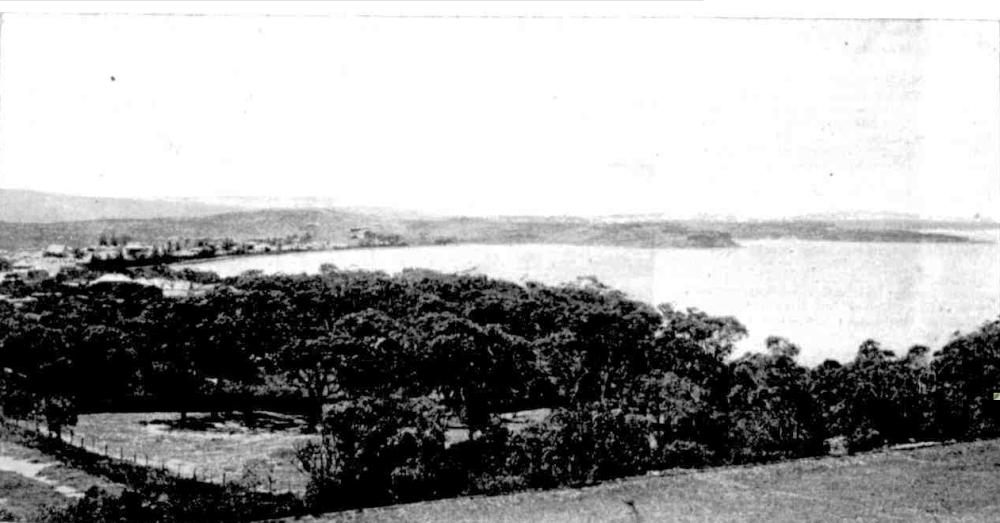
VIEW OF MANLY AND DISTANT HEADLANDS FROM THE SEMINARY.
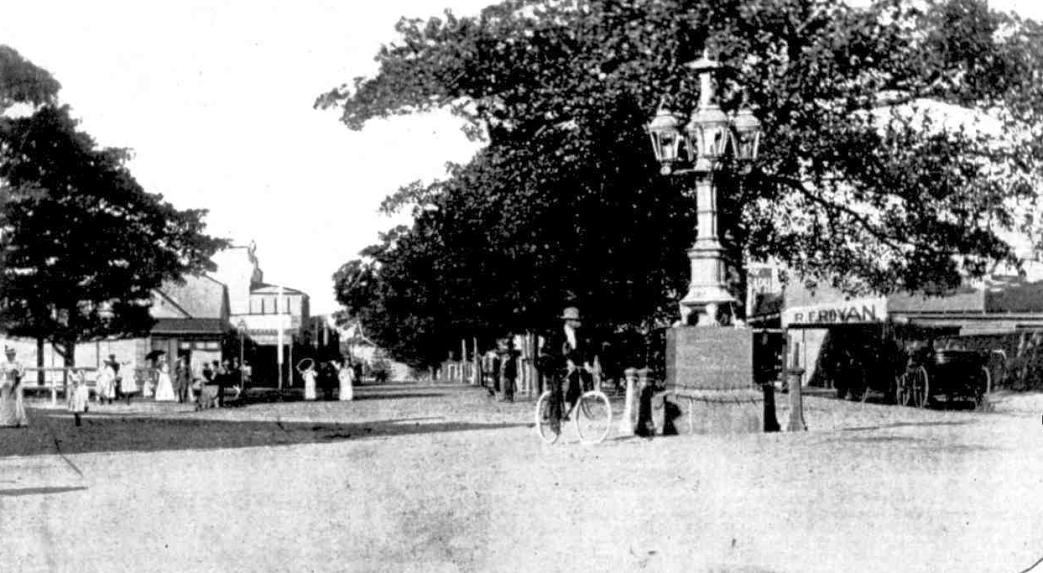
THE CORSO.
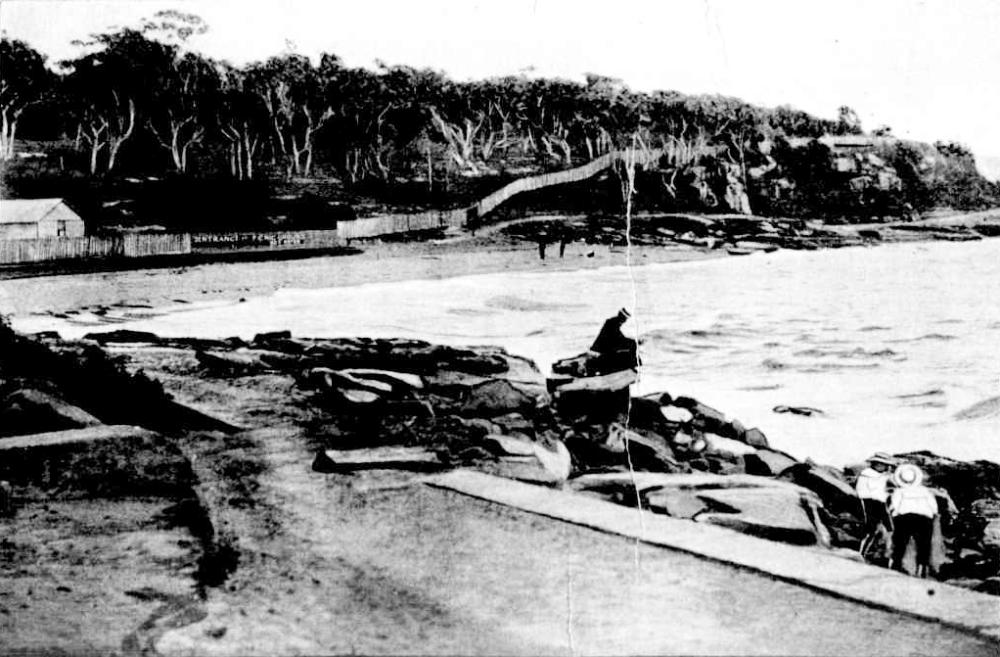
FAIRY BOWER BEACH.
1.-View of the Beach, looking towards the Seminary. 2. The Seminary. 3.-Looking Down on Manly.
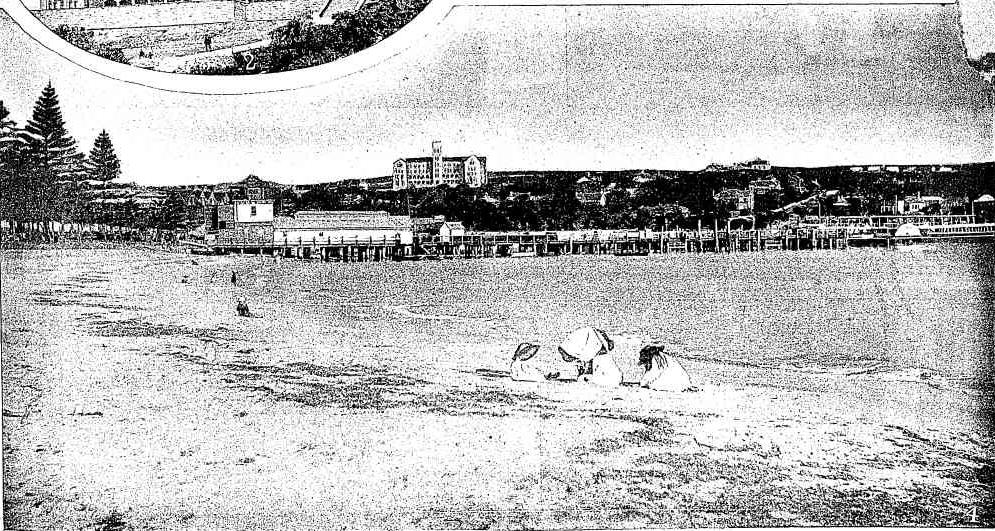
4.-A Favorite Playground..
THE PORT JACKSON CO-OPERATIVE S.S. COMPANY'S MANLY FERRY SERVICE.
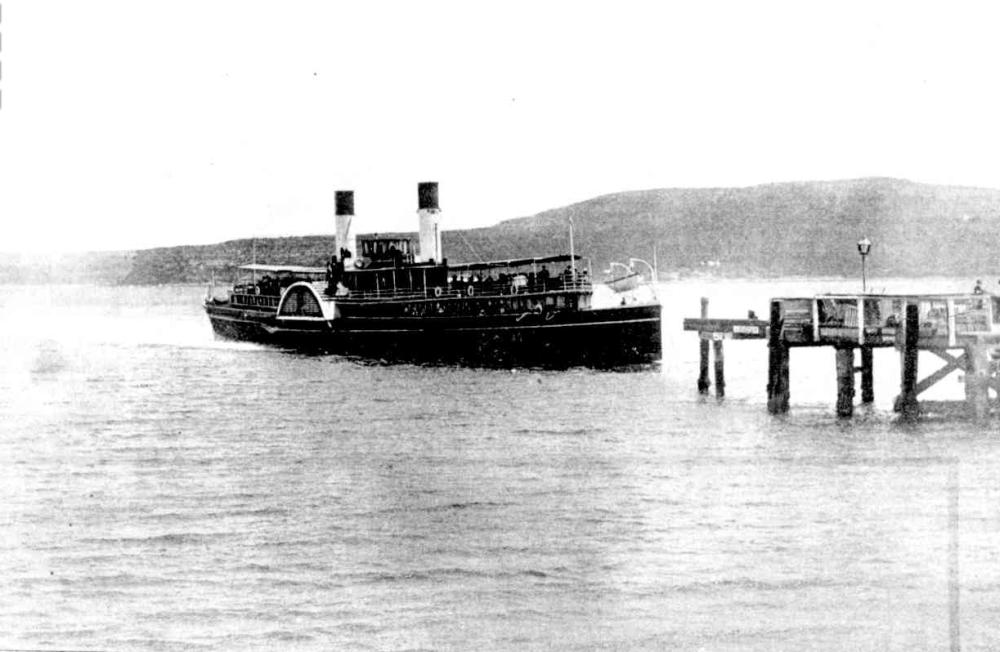
THE STEAMER BRIGHTON GOING ALONGSIDE THE MANLY WHARF.
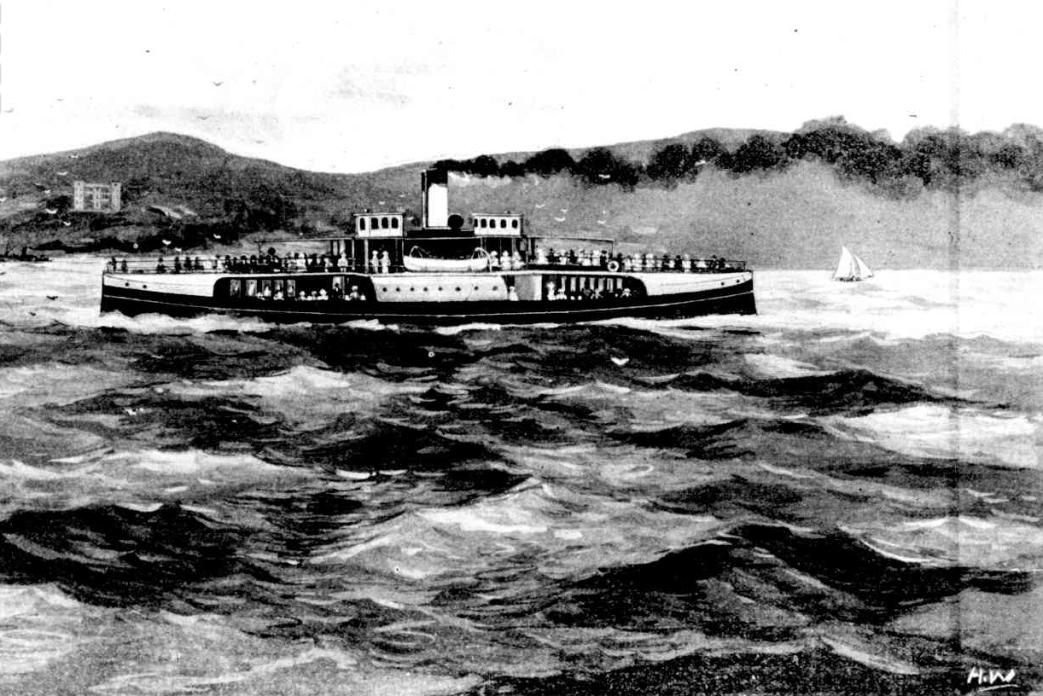
THE STEAMER MANLY ON HER WAY TO SYDNEY.
MANLY—THE QUEEN OF AUSTRALIAN WATERING PLACES. (1899, February 25).Australian Town and Country Journal (Sydney, NSW : 1870 - 1907), , p. 35. Retrieved from http://nla.gov.au/nla.news-article7132451
MR. F. A. LEE, the well-known Photographer, Wishes to inform the public that the Cosmos Photo. Co. has returned to West Wyalong, and has joined him in his studio in Main-street, opposite the Mining Registrar’s Office:
The studio has Undergone considerable alteration and intending customers can rely on getting Photographs of the highest order, equal to best city work, …
Come and have a look at our large display window and see the variety of Photographs, as Portraits, Outdoor Photos, Underground Works in Mines, Flashlights of …
Stock Pictures and Enlargements.
The Cosmos' visits residents in the surrounding district by appointment, and at most reasonable … We intend and guarantee to please our customers, Each sitter is made a study. COSMOS PHOTO. CO. Advertising (1899, July 28). The Wyalong Star and Temora and Barmedman Advertiser (West Wyalong, NSW : 1894 - 1895; 1899 - 1906), , p. 3. Retrieved from http://nla.gov.au/nla.news-article145091637
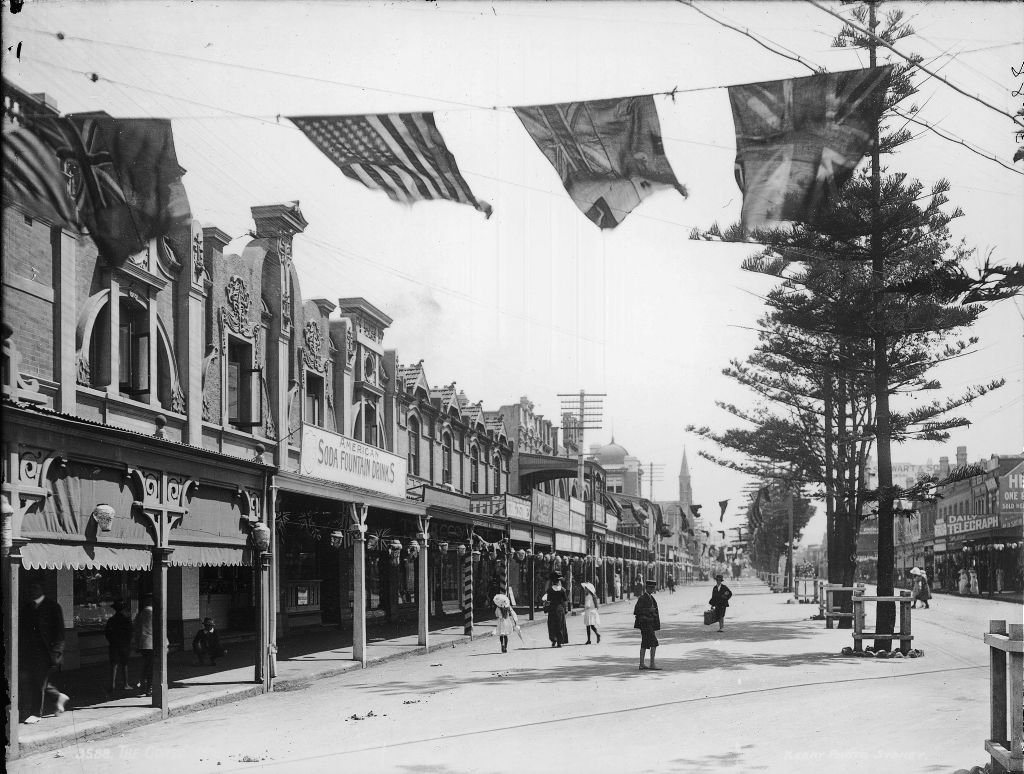
Manly Corso - circa 1908 - looks like a welcome for the Great White Fleet visit of American ships in 1908. In Australia the arrival of the Great White Fleet on 20 August 1908 was used to encourage support for the forming of Australia's own navy. It consisted of 16 battleships divided into two squadrons, along with various escorts. See Issue 128: From Colonial Navy Brigades in Second Hand Ships to Where the Australian Navy was Born – The Practical Verses of William Rooke Cresswell’s Charter
This item shows the proprietors of these shops and businesses, in some instances, changed hands rapidly. Tragically, this also relates what could happen prior to the advent of permanent Surf Lie Savers on Manly Beach and life saving devices and equipment:
DROWNED IN THE SURF.
The Treacherous Beach at Manly. BRAVE MEN TO THE RESCUE.
The ocean beach at Manly has again been the scene of one of those sad tragedies associated with bathing In the surf on the Western Pacific. The early hours of morning, for reasons which are not very apparent, are availed or by ladies, and as early as 6 o'clock the tragedy of to-day happened. It would appear that two young ladles— Miss Eda M. Jackson and Miss Maud Mitchell — were amongst others, bathing on the bench at the foot of Victoria-parade, about 200 yards east of the Corso, near the dressing-room.It has been known that there Is a deep hole In the vicinity, but owing toits shifting so frequently It Is difficult to locate. The two young ladles would appear to have had the misfortune to have stepped into the hole in the sandy beach. The undercurrent caught them, and the next moment they were carried out by the receding waves. Backwards and forwards they were washed, and finding that their feet could not touch ground they became excited, and screamed for help. At the time there were nearly all women and girls on the bench, but there were brave men approaching, and the screams of the distressed girls, hurried their steps to the scene. They lost no time In SEIZING THE SITUATION, and in a few seconds Sydney Williams and T. M'Carthy were in the raging surf, each intent on the rescue of one of the girls. M'Carthy secured Miss Mitchell, and SWAM ASHORE with her, battling the waves In their strong recoil to the subdued cheering of the excited gathering on the beach, Williams had u harder fight, but he BROUGHT MISS JACKSON ASHORE more dead than alive, but showing such animation as to warrant the hope of her recovery.' She was unconscious, but help was called In promptly. Dr. Hall, and a gentleman belonging to the Life-saving Society, whose name has not as yet transpired, conducting operations for restoration under artificial respiration.
Crowds
Crowds of people were gathered In the vicinity, and It was fervently prayed that the life of the young girl would be saved. She was known to nearly everyone present, and If ever human energy and forethought should have saved her life hers should have been saved. It was not to be, however. Time rolled on, and the work of the restorers was without result, and after two hours work the good doctor recorded that the life of the young woman had flown. There were sad hearts on the beach this morning, and in the words of a Manly resident, who was present, few chose to enter the water after the hope of the life of the young girl had passed. When life was pronounced extinct the police removed the body to the residence of her parents at the Ocean Beach Tea Rooms, opposite the Steyne Hotel, Mr. John H. Jackson, her father, being the proprietor of that establishment. The sad Incident threw a gloom all over Manly, where the family is well known.
It is a matter of general knowledge that the spot on the ocean beach where the girls lost their foothold is a very treacherous spot, There is always a deep hole to be met with, but It shifts so often that the entry beyond a certain limit Is attended at all times 'With great -risk. This morning, for instance, within a few feet of where the girls got into trouble there were others more than 12 yards farther out in the surf, and on perfectly safe ground.' Yesterday morning the Hon. D. O'Connor, M.L.A., was carried out beyond his depth, and was rescued only by the bravery of a young man who went to his assistance with a life-line round his body. This morning's calamity occurred near the same spot as where the venerable -legislator wa3 In trouble. Mr. Sid. Williams and Mr. T. M'Carthy, who figured as the heroes of today, are said to have been especially brave on the occasion, Mr. Williams, who resides in Cliff-street, heard the cries of the girls as he was approaching the beach. Mr. M'Carthy was on the ocean beach, and he arrived at the same time. It is stated that a brother of Mr. Williams played a prominent part in a sensational incident on the beach last year. The deceased young lady was 17 years of age. An Inquiry into the cause of her death will be held by the Coroner today. DROWNED IN THE SURF. (1903, March 7). The Australian Star (Sydney, NSW : 1887 - 1909), , p. 7. Retrieved from http://nla.gov.au/nla.news-article228529506
Visit Issue 125 to find out more about the first Surf Boat, at Manly, in: Surf Bathing and the Advent of Manly’s First Surf Carnival - 1907
There were also a great many long-term shop keepers and even a few adjustments from farms and orchards to being able to buy food on a Sunday which makes you wonder how a place doing its utmost to attract people to rest and eat on the day of rest and feasting could ever get ahead. Listed here, and under fires, are businesses for many trades and professions outside of providing food for the hungry masses:
News from Manly.
(FROM OUR CORRESPONDENT.)
Manly Beach, Tuesday.
That Land Sale.— Saturday afternoon was a time, of great excitement in "our village." Crowds of people arrived in the various boats, bent upon having a sight of Freshwater, if not, a site upon the banks of the stream. Every conceivable kind of trap was chartered for the conveyance of buyers, and quite a cavalcade was organised. Throughout the afternoon and evening Manly was a most lively village. You will have noted from your commercial reports that the sale was brisk and successful. Of course one does not like to see all the pleasant retreats about "our village" being divested of their natural beauty; but as the residential population increases, enlarged vehicular promenades are the more needed, and every new subdivision renders a newly-made road necessary, so that some way or other matters become what natural philosophers call "compensating."
Fishing Excursions.— The afternoon of Saturday is generally selected for excursions to the romantic neighbourhood of Narrabeen Lake. Just at the present time the lake is teeming with fish, and in a very brief space of time a small hamper may be filled. Last Saturday several parties were very successful. I often wonder that some enterprising settler does not procure a few boats for public hire. I feel sure that a trade can be done in that direction.
Sunday Selling.— From a "brevity" in one of your recent issues, I noticed that several persons had been fined in small sums for having sold fruit on Sunday. One hardly knows how these remote cases, now and again, turn up, unless it be by way of warning. If the fruit shops of many of our suburbs were absolutely closed on Sunday, what would become of forgetful picnic perpetrators.?
The law as it now stands certainly requires amendment. Selling fruit on Sunday ought, or ought not to be, punishable. For my part I see no harm in the selling of a few peaches or apples to hungry folks on Sundays.
YOURSELVES.— The Evening News enjoys a large circulation here, and that circulation is rapidly increasing. I wonder whether this latter fact is caused by your removal to your new and splendid office, or by my having begun to chronicle the news of the district in your valuable and readable columns?
Sunday dress of the Prospect Camp masher— Tweed trousers, flannel singlet, with a bright red or blue neck cloth, tied sailor fashion, and a soft felt hat. News from Manly. (1884, December 9).Evening News (Sydney, NSW : 1869 - 1931), , p. 5. Retrieved from http://nla.gov.au/nla.news-article107275747
SARGENTS GOING TO MANLY.
The corner block, comprising three shops, at the beginning of the Corso, Manly, and facing the wharf, was offered for sale by auction. The property has a frontage of 70 feet to the Corso, and, occupying, as it does, one of the finest business sites, the bidding was very brisk. Eventually it was secured by Messrs. Sargents, Limited, the well-known caterers, who intend building there, in the near future, a large cafe and restaurant on the same lines as their other fine establishments throughout the city. The price paid-£100 per foot — constituted a record for Manly. SARGENTS GOING TO MANLY. (1910, April 7). The Catholic Press (Sydney, NSW : 1895 - 1942), , p. 34. Retrieved from http://nla.gov.au/nla.news-article105021230
A. McKYE, PITTWATER-ROAD AND CORSO, MANLY.
The visitor to Manly will find that they cannot do better than buy their bread from A. McKye, whose shop on the Corso is so conveniently situated. Of course, carters call as directed; but when one is anxious to choose cakes and pastry it is well to visit the shop. Purchasers will find that the bread is 'particularly light and well-baked; the brown bread is particularly recommended; it is most nutritious and easily digested. A. McKYE, PITTWATER-ROAD AND CORSO, MANLY. (1918, January 10). The Catholic Press (Sydney, NSW : 1895 - 1942), , p. 35. Retrieved from http://nla.gov.au/nla.news-article106094707
Not the Only Fire!
The disastrous fire which caused so much damage in 1887 is not the only to destroy commercial premises at Manly - among these two separate incidences bootmakers, a trade now gone from all but the Williams family of famous boots, appear again and again:
DISASTROUS FIRE.
BIG BLAZE AT MANLY.
HOUSES AND SHOPS BURNT.. HEAVY LOSSES REPORTED.
The great heat today was responsible for one of the worst fires that Manly has ever known, and as a result nine families at least are homeless. There was considerable difficulty In getting any news of the outbreak, for the reason that many of the telephone wires were burnt through, and the connections gone, but it is definitely known that the main fact is as above stated. Apparently the first outbreak took place on the Sydney-road that leads from Manly to the Spit. There is a steep hill out of Manly, and at the top of this is a neighborhood known as Red Hill. Here, in a shop occupied by Mr. C. E. Guest, a grocer, the flames were first seen, and almost as soon the alarm was given at least three other shops, a greengrocer's, a stationer's, and a bootmaker's, were swept by the flames. Combined with the heat of the sun the flames were a terrific drawback to the work of the firemen, who, under Station Officer Bulloch, had rushed to the scene with the engine as soon as the news became known. Smoke was sweeping down over the harbor, and for a while Sergeant Holtsbaum,- the police officer in charge, had to stop the traffic on the Sydney-road: It was not long before the houses and shops, with most of their, contents, were burned clean out. Guest's shop is at the corner of Thornton-street and Sydney-road, and at first it was thought that the handsome villas in the former thoroughfare were in the sheet of flame that swept up the road. These fears, however, were soon net at rest, but while the blaze at Red Hill was at its height there came another alarm. There was another fire further along, so the messages said, and a contingent of the firefighters rushed off along the Sydney-road to see what was happening.
There the firemen found the people of a dozen families frantically trying to beat back the advancing blaze, which had, apparently, been started in the grass by a brand from the other fire. But their efforts were useless, and soon five houses in Wanganilly-street, a thoroughfare off the Sydney-road, were going up in flame and smoke. With branches and bags the people tried to stop it after it had passed over and levelled the houses to the ground, but when the latest meagre reports came through the fire was still carrying everything before it. When the last news was obtained it was estimated that about £7000 worth of damage had been done. DISASTROUS FIRE. (1915, March 8). The Sun (Sydney, NSW : 1910 - 1954), , p. 5 (FINAL EXTRA). Retrieved from http://nla.gov.au/nla.news-article229314151
BLAZE AT MANLY
TWO SHOPS- BURNT OUT EXCITEMENT ON THE CORSO Sensational Wind-up to Annual Carnival
Fireworks were one of the most attractive features at Manly carnival last night — the last of the annual festival— but enormous crowds of visitors and local residents were treated to an unexpected feast of greater excitement. Two shops on the Corso were practically burnt out; three adjoining premises were damaged by water and smoke. The fire was first seen by Mr. William Howard. While passing the shop occupied by Gordon Adrian, watchmaker, he saw smoke issuing from beneath the door. He immediately gave the alarm.
Corso Blocked
But the flames had obtained a fair start, and when the local brigade arrived the whole shop was burning fiercely. Thousands of the carnival crowd completely blocked the Corso, and the police only cleared a passage for the brigade motor with difficulty. Owing to the dilapidated nature of the buildings, the fire spread to the shop next door, which was occupied partly by Joseph Ellis, bootmaker, and Phil James, hairdresser.
The Flames Spread
Soon this shop was a mass of flames, and the brigade's task became more difficult every moment. Then it was reported that Oswald Hodgson, who lived in a flat at the rear of Adrian's place had been trapped by the flames but when firemen investigated they found the flat locked, but burning like fury. Soon, however, a hose told its tale. Round in front of the flames were spreading merrily and the roof of the premises adjoining Ellis' caught alight. Then that of the next place, tenanted by J. Hutchins, bootman, caught fire.
War Sang's Shop
In half an hour the firemen gained control of the ominous-looking outbreak, but not until War Sang's fruit shop on the eastern side of Adrian's had been badly damaged by smoke and water. The origin of the original outbreak is unknown. The total damage is estimated at £500. All the shops are lock-up premises. They belong to the Perpetual Trustee Company.
Manly in the Dark
Later on the crowds were treated to further excitement. Owing to a failure at the power station, the whole district's light service refused to work, and itwas not until after 8 o'clock that the lights were turned on. Then the carnival went on merrily. BLAZE AT MANLY (1923, February 11).Sunday Times (Sydney, NSW : 1895 - 1930), , p. 2. Retrieved from http://nla.gov.au/nla.news-article120531465
Some other shops and tree lined streets of early Manly:
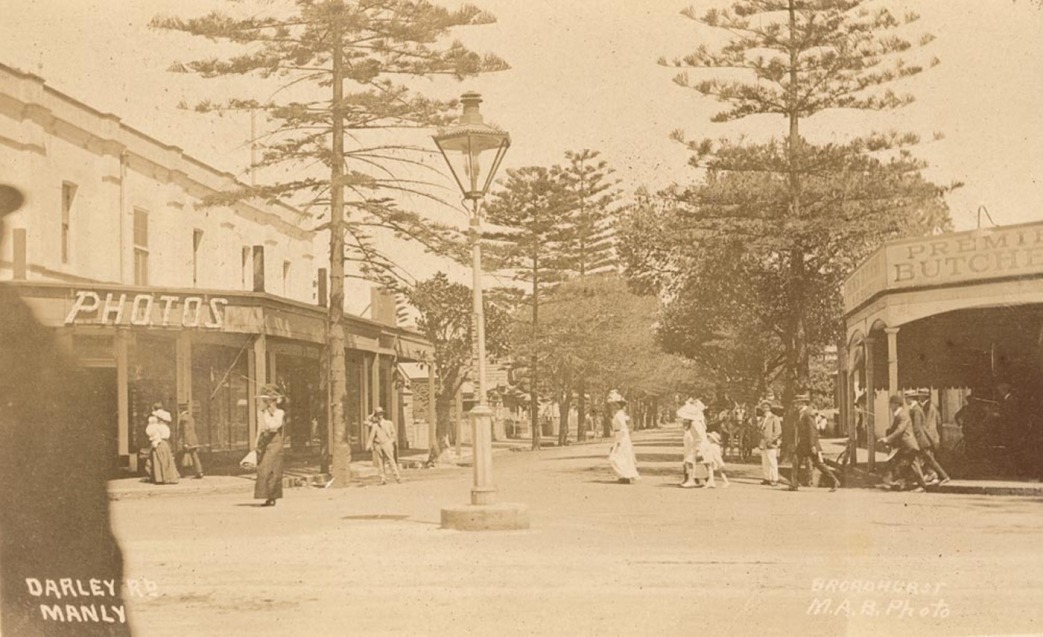
'Darley Road' circa 1900-1927, from Album: Scenes of Manly, N.S.W., Sydney & Ashfield : Broadhurst Post Card Publishers. Image No.: a105551h, courtesy State Library of NSW
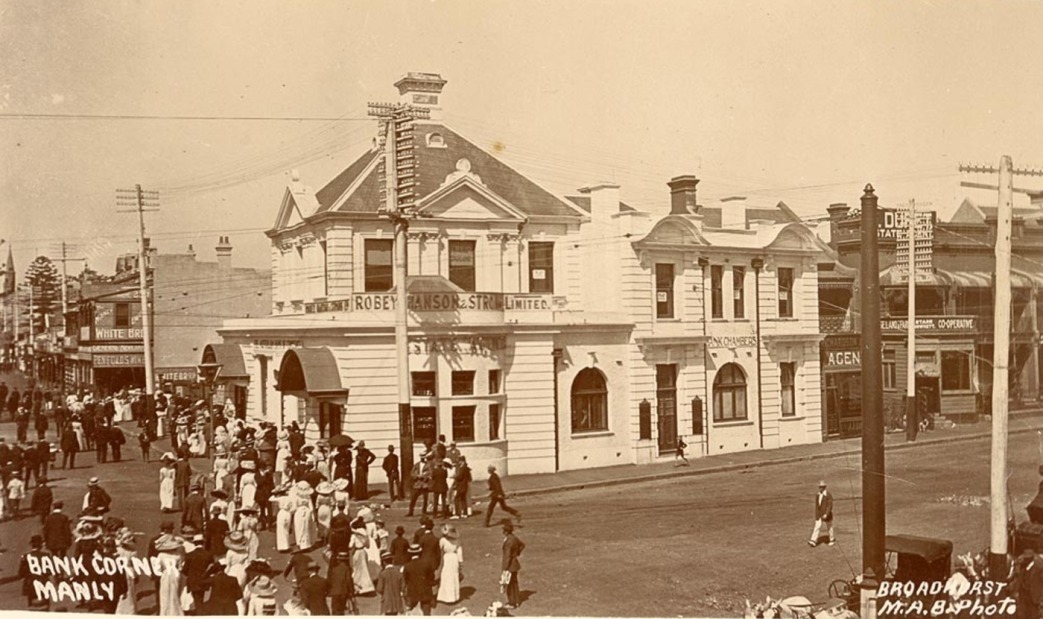
'Bank Corner' circa 1900-1927, from Album: Scenes of Manly, N.S.W., Sydney & Ashfield : Broadhurst Post Card Publishers. Image No.: a105552h, courtesy State Library of NSW
Shortages
As mentioned above Manly butchers, backed by their Council, dug their heels in over new regulations regarding the display and selling of meat. This dispute, although finally resolved, was not ended quickly and led to people not coming to the area, when it was building its reputation on being the place to come as it as perceived as unhealthy when it had prided itself on being a place top restore health, and shortages for those that did as the dispute dragged on. We include this quaint poem to set the tone, and wonder....
These little epistles, run regularly on doings at Manly and 'Manlyites' appeared under the following illustrated Header:

The Manly Council's meeting on Tuesday night brought out some excellent debates. On the subject of securing a garbage destructor for the municipality, Alderman Dr. Neale, who has a' holy horror of flies and smells, was both witty and enlightening. On the subject of the common fly, Dr. Neale is decidedly whole-hearted. Beg pardon for the following: —
A Manly alderman named Neale,
Who studies well the common weal.
And lights disease and death all day
For love of man and doctor's pay,
Looks round — to find with his keen eye,
That man's worst foe's the household fly!
He doesn't mind the German scare,
And for the Japs he doesn't care.
Invasion's fears he laughs away,
And all that fills us with dismay.
"Australia's danger, always nigh,"
He thunders, "is the common fly!"
It's fine to hear the Doctor storm
About this beast of minute form,
He'll talk for hours with perfect ease
About the fly's enormities!
"More men have died from Its foul touch
Than from the wars of French or Dutch."
He's made this tiny creature rise
To almost elephantine size.
But Manly folks are not afraid,
For he's begun a fly crusade,
And by his aid— 'tis no surmise,
On Manly soon there'll be no flies!
MANLY (1911, March 10). The Sun (Sydney, NSW : 1910 - 1954), , p. 4 (LATEST EDITION). Retrieved from http://nla.gov.au/nla.news-article221568814
MANLY'S MEAT SHOPS.
HEALTH BOARD'S ULTIMATUM.
For several months there has been a dispute between the Manly Council and the Board of Health regarding the necessity for enclosing the local butchers' shops with glass or wire gauze. The butchers have protested against the enforcement of the ordinance contending that the provision of electric fans is sufficient. Their action has been supported by the council. Last night something like an ultimatum was received by the council from the board. The communication read:— "With reference to recent correspondence between this department and your council In regard to the failure of the council to carry out the provisions of ordinance 56 of the Local Government Act, Insofar as they apply to enclosing the fronts of butchers' shops, I am directed by the Board of Health to hereby give your council notice that unless within 60 days from this date it is found that the provisions of ordinance 56 have been carried out within the municipality, such proceedings of the law provides will be taken to secure the carrying out of such ordinance."
Alderman Neale: It Is our power to get this ordinance repealed. The whole thing is absurd. Sydney gets along well without this closing in. Aldermen Quirk supported, and made a hit back on the board generally. Ultimately It was decided to make arrangements for securing a repeal of the ordinance altogether. MANLY'S MEAT SHOPS. (1911, September 13). The Sun (Sydney, NSW : 1910 - 1954), , p. 11. Retrieved from http://nla.gov.au/nla.news-article221541668
The council, however, found that they had the power to rescind this particular ordinance (No. 56) within the municipality, and this was done at last night's meeting, on the motion of Alderman Neale seconded by Alderman Heaton, and a new clause substituted to the effect that fans would be sufficient. MANLY'S MEAT SHOPS. (1911, September 27). The Sun (Sydney, NSW : 1910 - 1954), , p. 10 (LATEST EDITION). Retrieved from http://nla.gov.au/nla.news-article221546756
THE MANLY HARVEST.
" 'Nuff Said" writes: —
And in a land that is reputed to be flowing with milk and honey there is a spot on earth called Manly, which is not flowing with milk and honey at present.
There is meat, fruit, fowl, fish, and vegetables: yea, enough even to fill 100 baskets; and so the stranger In a strange land came from afar, and he did gird up his loins and enter Manly on the Sabbath; and there sure he beheld the meat, vegetables, fruit, fish, and fowl. It was amongst the people, and the stranger did not uphold his hands in joy; but, alas! he clapped both hands on to his proboscis, and kept them there.
And lo! he did approach a native of the place called Manly, and he did say: "Whence comest this, brother? And are the little children and their fathers and mothers privileged to monkey about amongst the meat, fruit, fish, vegetables, and fowl?" And behold the native of the placed called Manly answered him not," but he did point away to the sea, whereupon the stranger did ask If there were wise men selected from the present generation to govern the beach, and when the harvest appoars in the: shape o( ,tfie; ; meat, fish, fruit, fowl, and' vegetables that the good people who Journey " to" -Manly "-in order to "take the waters", should also be supplied with the usual condiments, not forgetting . the mustard as most of the good brethren and sisters are partial to hot dinners.
And lo! and behold the stranger was seen girding up his loins, as he did think that If he did partake of the mustard he would surely have a hot time, and he had already had his fill nasally, so he straightaway fizzed off to a city of cleanliness as fast as God would allow, and there he did mourn for the people who did "take the waters" at a place called Manly, amid the meat, fish, vegetables, and fowl (very).THE MANLY HARVEST. (1913, December 17). The Sun (Sydney, NSW : 1910 - 1954), , p. 1 (FINAL EXTRA). Retrieved from http://nla.gov.au/nla.news-article229349562
POSITION AT MANLY.
SOME SHOPS OPEN.
Manly, with its hotels and hundreds of boarding-houses filled with visitors, is bound to feel the effects of the meat famine severely in a few days. Today all the hotels have the usual menus, but the smaller boarding-houses are beginning to feel the pinch. M'Kenzie's, Ltd., who have two shops, one on the Corso and the other in Pittwater-road, are not doing any business. "We have nothing to sell," says the manager. Derham's, in Sydney-road, and Kleemo's, in Pittwater-road, are also closed. Irving's, in Raglan-street, had a couple of carcasses of beef this morning, secured from the Pittwater district, and were selling out quickly. Mr. S. S. Baker of the Corso, was doing a roaring trade this morning In -mutton. "Last Thursday," Mr. Baker explained, "I bought 150 carcasses of frozen prime hoggets that were intended for he New York market. They have kept me going, and will last till to-morrow night." All the Manly butchers are unanimous in their loyalty to the platform of the master butchers, and will help each other in the struggle. POSITION AT MANLY. (1914, February 18). The Sun (Sydney, NSW : 1910 - 1954), , p. 7 (FINAL EDITION). Retrieved from http://nla.gov.au/nla.news-article221562317
The main reason Manly shops would run short of anything was and remains the popularity of this seaside destination. As we included fish and chips by the beach as much as picnicking in a day out, particularly that day of all days when everyone goes to the beach - New Year's Day - there were bound to be many times when this would recur:
SHOPS LEFT BARE- MANLY'S RECORD DAY
NEW YEAR'S Day was a record one for Manly and was responsible for a 'cleaning out' of provisions in a number of the shops by the great hungry army of pleasure seekers. In some cases motorists left the main shopping centre and went in the direction of the Spit and Narrabeen hunting for food.
Yesterday residents who endeavored to purchase goods were informed that storekeepers had sold out. According to the Town Clerk of Manly, Mr. Wellings, never before had so many people gathered on the beaches as on New Year's Day. SHOPS LEFT BARE (1929, January 3).Evening News (Sydney, NSW : 1869 - 1931), , p. 3. Retrieved from http://nla.gov.au/nla.news-article115694982
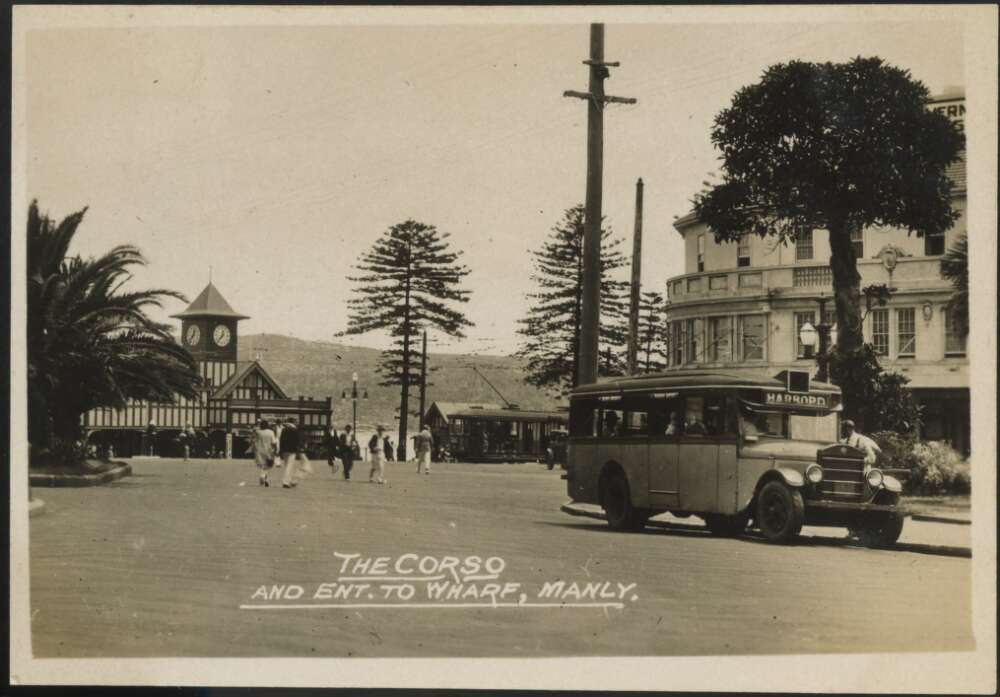
The Corso and ent. to wharf, Manly, Circa 193?, courtesy National Library of Australia, http://nla.gov.au/nla.obj-141276133
Another shortage of everything needed was attributed to post-war scarcity as much as post-war industrial action an shows women organising and attending a protest on Manly Corso against not being able to shop for basics:
Rowdy Manly Meeting
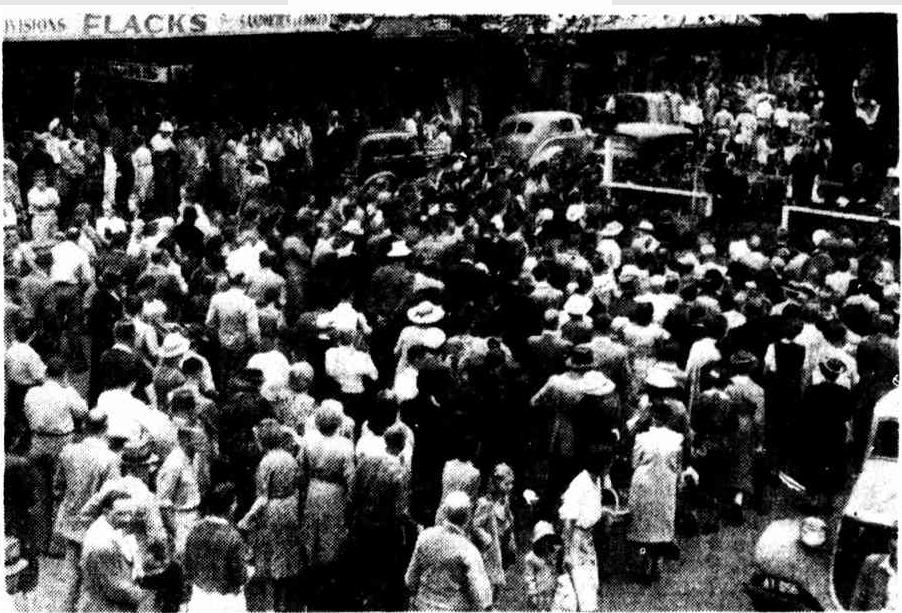
HOUSEWIVES gathered in the Corso. Manly, today to protest against "the burden imposed on them by the War and recent industrial trouble."
Manly Housewives In Rowdy Corso Meeting
The Corso, Manly, was in uproar this morning when a meeting of housewives, called as a protest against continuation or wartime burdens developed into a noisy political meeting.
Some speakers were heckled, booed, and counted out. When a woman with a notebook and pamphlets In her hand rushed to the platform and tried to grab the microphone,' an onlooker In the crowd yelled, "That woman's a Communist!" Traffic stopped, tradespeople stood at shop doorways, and people leaned, out of office buildings on the Corso, to watch the excitement. The meeting was originally called by the Mayor of Manly (Alderman J. Anderson) , following petitions by a number of Manly housewives, "as a protest against the continuance of burdens forced upon them during the war years/also by the recent industrial trouble." Organiser of the meeting was Mrs. H. J. Hawkins.
'"Women Have Tongues"
Actress Evelyn Gardiner spoke vigorously for nearly half an hour, and was cheered when she demanded; "What's wrong with women? We've got tongues!" She moved a resolution, "that this meeting of housewives views with alarm the possibility of a recurrence of the recent restrictions, and asks that the Federal and State Governments forthwith take all necessary steps to ensure that a similar condition shall not occur in the future." She was heard quietly. Trouble began when the second speaker, Mrs. Ethel Watson, vice president of the Housewives Association, got to the microphone and opened with a reference to "the cancer of Communism. . . .
Immediately, a middle-aged woman in black, with her hair in a bun on top of her head, called out, "I thought the housewives weren't political?" Mrs. Watson tried to go on talking, but there was a burst of heckling and jeers from several sections Of the crowd, and repeated ' protests of "You're bringing politics into it. You're getting ready for the elections this year."
The Mayor look the microphone and appealed to the crowd to give the speaker a fair hearing, adding that it was not intended the meeting should be a political one. When Mrs. Watson continued, she urged women to mass together and demand what they wanted. "The fruit season's here, and there's no sugar," she said. "Milk is cut when we least expect it; there are no potatoes, and there is inferior bread."
Woman Rushes Platform
As soon as Alderman Anderson put the motion to the meeting a woman wearing a red blouse and carrying a notebook and pamphlets, rushed to the platform. Saying, "I desire to speak against the motion," she tried to grab the microphone. A woman from the crowd yelled, "That woman's a Communist." .."I say this Is a political meeting because the elections are to be held this year!" called a man from the side of the crowd. He was immediately booed. Alderman Anderson again put the motion to the meeting, and it was carried. Saying, "I declare this meeting closed," he moved off the platform. Several people tried to mount the platform, and the crowd began to develop ' into a noisy brawl, but after 15 minutes the meeting gradually broke up. Police watched it from the outskirts. but were not called in.
Rowdy Manly Meeting (1946, January 19).The Sun (Sydney, NSW : 1910 - 1954), , p. 3 (LAST RACE ALL DETAILS). Retrieved from http://nla.gov.au/nla.news-article228785327
The opposite of this is, of course, foul weather in fair seasons;
Rainy weekends cost shops £100,000
SHOPKEEPERS at beach suburbs have fast £100,000 because of Sydney's succession of wet weekends.
Insurance companies have also had to pay out big sums for cancelled, postponed and washed-out events. This is Sydney's ninth wet weekend this year. It has rained every weekend but one since February 1. For the past seven weekends beaches from Cronulla to Palm Beach have been deserted and food shops and milk bars empty.
Food dumped
Hundreds of pounds' worth of pies, hamburgers, meat, buns, bread and cakes have had to be dumped. Proprietors say they have lost huge amounts because of wastage. Mr. Con Ryan, manager of a Queenscliff milk bar, says: "Time and again we've stocked up for the weekends, but have usually ended up by dumping the food. "Each time it rains on the weekends it means £50 down the drain for us."
Shows insured
Mrs. F. M. Cooks, of a general store in Pittwater Road, Mona Vale, says the waste in her shop has been "shocking." "We're right on the main road and always do excellent business 'from passing cars in the summer," she adds.
Big pay-outs have followed heavy insuring of suburban shows, carnivals and sports meetings against rain. Harvey Trinder Pty., Ltd., city insurance brokers, paid the organisers of the Castle Hill show £1000 last weekend because of rain. Rainy weekends cost shops £100,000 (1950, March 19). The Sun (Sydney, NSW : 1910 - 1954), , p. 5. Retrieved from http://nla.gov.au/nla.news-article230167863
Not that that has stopped the value of the shops themselves rising:
MANLY SALES OF £109,750
Corso Property
Two blocks of shops and flats in The Corso, Manly, were sold at public auction yesterday for a total of £109,750.
The Commercial Banking Co. of Sydney Ltd. bought a two storey shop premises at 8-12 The Corso for £56,750.
The second building, comprising five shops and dwellings, at 14-22 The Corso, was bought by a syndicate of the five shop tenants for £53,000.
Each property has a frontage of 66 feet to The Corso and a depth of 156 feet.
The sales were made by Richardson and Wrench Ltd., in conjunction with L. J, Hooker Ltd. and Hardie and Gorman Pty. Ltd. MANLY SALES OF £109,750 (1950, May 13). The Sydney Morning Herald (NSW : 1842 - 1954), , p. 9. Retrieved from http://nla.gov.au/nla.news-article27572298
Manly shops, especially those aligning the Corso, remain a common meeting ground for 'Manlyites' and visitors alike. There's nothing like strolling down that sunny place when the jazz is playing, great smells of food through the air, and taking hot fish and chips down to the shore or wending your way to the Manly Art Gallery on the harbour side.
The next big Manly attraction will be the Manly Arts Festival from 16 – 30 September 2016 and this year will include:
Visual Arts exhibitions and events
Music events
Literary and theatre events
Film events
Dance and Performance events
Youth events
Workshops
Kids events
As the Port Jackson & Manly Steamship Company stated much earlier on to promote its ferry service Manly remains "Seven miles from Sydney and a thousand miles from care" - and that Corso, and all those who promenade are not just spectators to all the history they see and all those others passing by - they are, too, part of the parade:
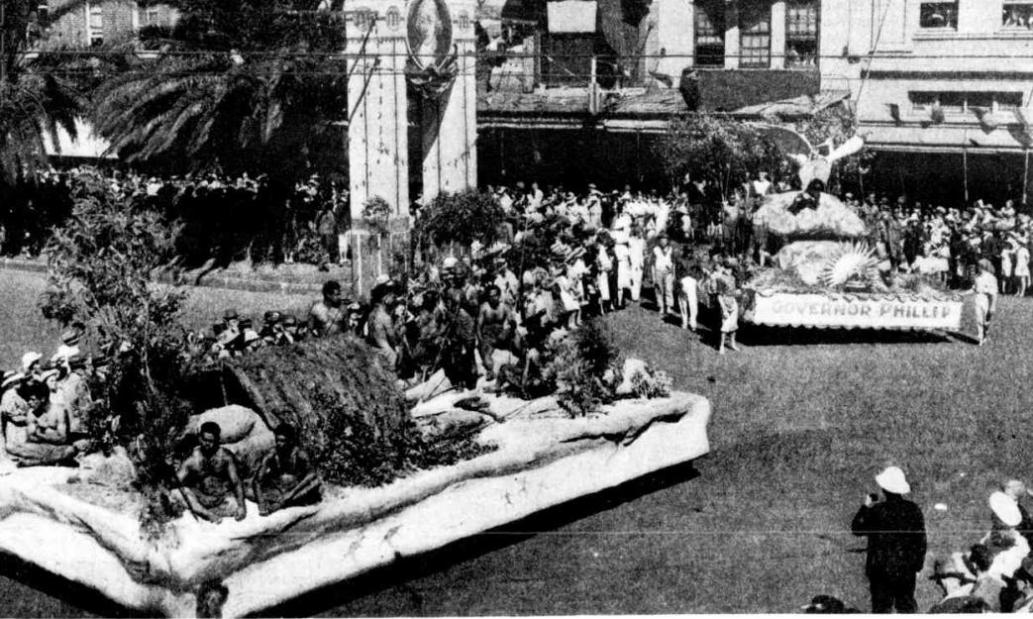
Floats in the Procession in Manly Corso on Saturday
Manly's 150th Anniversary carnival began on Saturday afternoon, when about 20,000 people gathered to see a re-enactment of the landing of Captain Arthur Phillip, who visited Manly Cove before proceeding up the harbour to the site of the first settlement. The scene was colourful and animated. Craft of all kinds crowded Manly Cove, off the East Esplanade. In the background was a replica of Phillip's ship Supply,
Manly Celebrates the Sesqui-Centenary (1938, February 23). Sydney Mail (NSW : 1912 - 1938), , p. 24. Retrieved from http://nla.gov.au/nla.news-article166229504
With a new pool opening soon – Andrew Charlton pool - at Manly, a small inisght into another attraction at a younger Manly that brought thousands to the 'fishing village', and some of the usual trials communities go through when undertaking such ventures and making sure they 'get over the line':
VANDALISM AT BATHS: MANLY COMPLAINT
Alderman Samuels stated at Manly Council meeting, last night that vandalism was rampant at Manly Baths. He said that, although the baths were still in the contractor's hands, hundreds of people were bathing there. Last Sunday over 200 people paid for admission. He understood that the council was not receiving any of the admission money, and would like to know who was. He had examined the portion where the club room is situated, and found that every pane of glass in the place had been smashed. Boys were kicking a football about in the room, no one was in charge. The Mayor stated that instructions had been posted up outside the baths warning bathers that they bathed there at their own risk. He promised to make a personal examination of the baths. VANDALISM AT BATHS (1926, March 17).The Sun (Sydney, NSW : 1910 - 1954), , p. 10 (FINAL EXTRA). Retrieved fromhttp://nla.gov.au/nla.news-article224058404
NEW MANLY BATHS: work again held up more money needed
Owing to a dead-lock between the contractor and the architect, no work is being done at present at the Manly Baths," said Alderman Quirk, at the council meeting last night. The council decided to co-operate with the swimming club In making the official opening of the baths worthy of the occasion. The Governor will be asked to perform the opening ceremony after which the swimming club will take charge. The contemplated programme Includes the broadcasting of the official speeches, the attendance of the Manly Band, and the appearance of the sprint and distance champions, Messrs. Doyle and Christie, and the lady champions, Misses Couldwell and Pawley. Invitations will be extended to the residents and secretaries of all affiliated swimming clubs and the local sporting bodies to attend. On Thursday an Inspection of the baths will be made by the works committee, and the architect will be asked to attend. NEW MANLY BATHS (1926, August 25).The Sun (Sydney, NSW : 1910 - 1954), , p. 2 (FINAL EXTRA). Retrieved fromhttp://nla.gov.au/nla.news-article222726577
CHARLTON TO SWIM AT NEW MANLY BATHS
The Manly Amateur Swimming Club has received a telegram from “Boy” Charlton, who is at Gunnedah, stating definitely that the champion will appear in an exhibition swim at the opening of the new Manly Baths next Saturday afternoon. After the carnival the swimmers will be entertained at the “Dungowan”. CHARLTON TO SWIM (1926, October 28).Evening News (Sydney, NSW : 1869 - 1931), , p. 6. Retrieved from http://nla.gov.au/nla.news-article117318755
THE NEW MANLY BATHS.
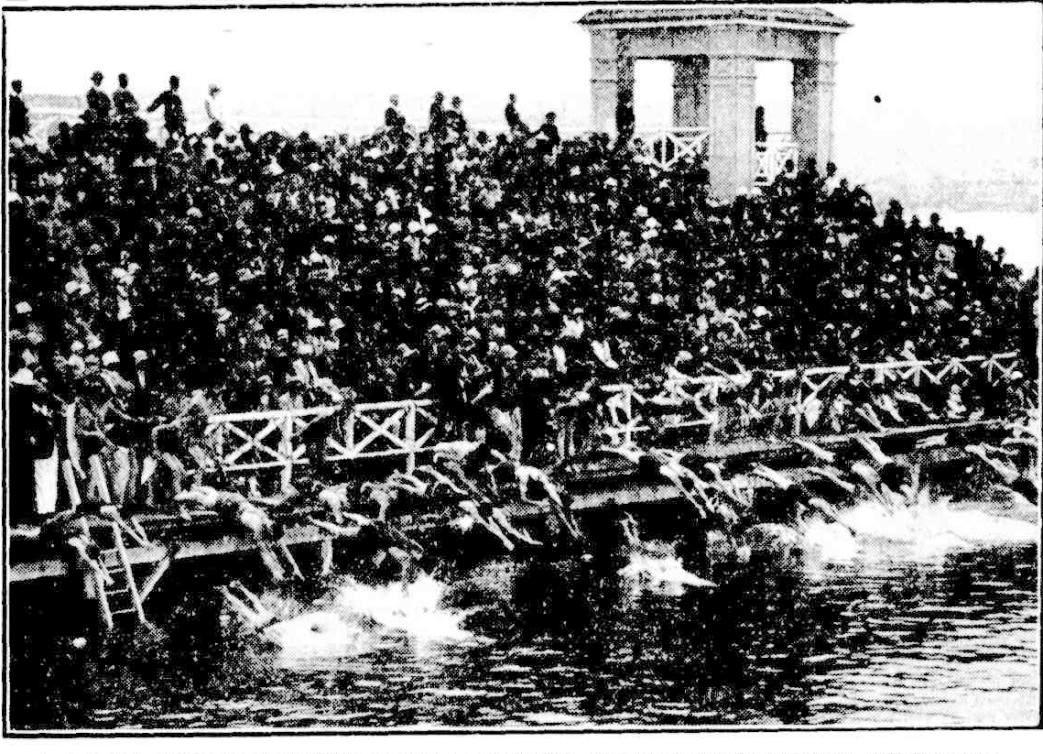
A LARGE CROWD WITNESSED THE OPENING OF THE NEW MANLY- MUNICIPAL BATHS ON SATURDAY. A PICTURESQUE FEATURE WAS THE PLUNGING OF 100 SWIMMERS INTO THE WATER AT A GIVEN SIGNAL. THE NEW MANLY BATHS. (1926, November 1). The Sydney Morning Herald (NSW : 1842 - 1954), , p. 14. Retrieved from http://nla.gov.au/nla.news-article16322835
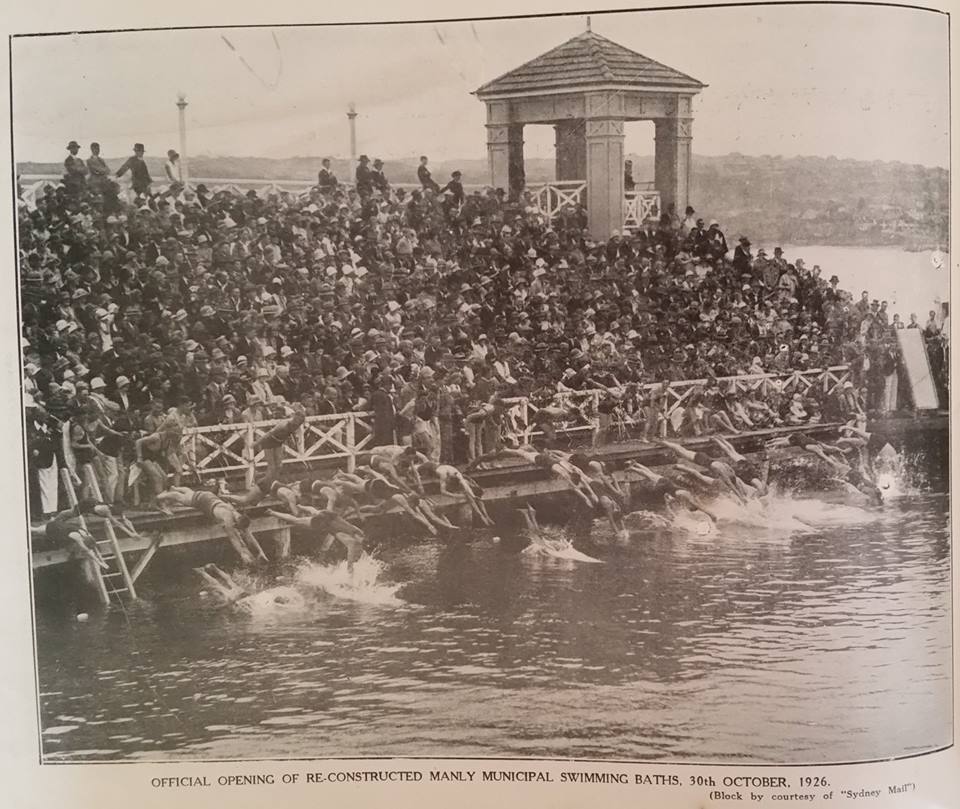
Above is the same image, broader, cleaner, as taken from the Jubilee Souvenir of the Municipality of Manly 1877 -1927 - courtesy Scott Lea, Old Sydney Album page on Facebook.
NEW BATHS AT MANLY
To celebrate the opening of the new Manly baths by the Mayor (Alderman Keirle) a swimming carnival was held yesterday. Alderman Keirle said that the baths had cost £12,000 to construct. NEW BATHS AT MANLY (1926, November 1). Daily Advertiser (Wagga Wagga, NSW : 1911 - 1954), p. 2. Retrieved from http://nla.gov.au/nla.news-article145258931
HOT SEA BATHS
MANLYS ENTERPRISE
MANLY’S new hot salt-water baths were officially opened last night by the Mayor, Ald. Keirle. The building, which stands Immediately behind the South Steyne surf sheds, is a two-storey structure, and has a distinctly attractive appearance. It cost £5000, the money having been advanced by the Port Jackson and Manly S.B. Co. at 6 ½ per cent Everything in it is of Australian manufacture. Electric baths are a feature of the establishment, and will provide treatment for a number for ailments. It Is intended that the services of a male and female massage expert will shortly be available to patrons.HOT SEA BATHS (1926, June 5). Evening News (Sydney, NSW : 1869 - 1931), , p. 2. Retrieved from http://nla.gov.au/nla.news-article114382115
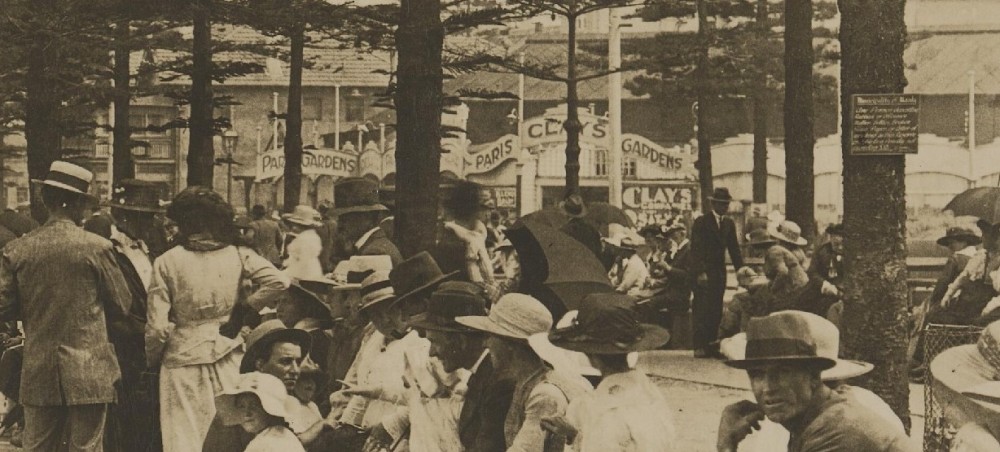
A TIME LIMIT?
DIGGERS' PREFERENCE MANLY BATHS JOB
ALD. QUIRK said at Manly Council last night that he thought a time limit should be placed on preference to returned soldiers.
WHEN It was announced that 'Dick' Eve, world's champion diver, had been appointed manager at the new baths, Ald. Barton expressed regret that a returned soldier had not secured the selection. Ald. Quirk said if all appointment, were to go to returned soldiers, the rising generation would never bare a chance. He thought a time limit should be placed on preference to returned soldiers. As a matter of fact, Mr. Eve was too young to enlist at the time of the war. It was stated that the selection had been made from 22 applicants. A TIME LIMIT? (1926, November 10).Evening News (Sydney, NSW : 1869 - 1931), , p. 13. Retrieved from http://nla.gov.au/nla.news-article117324491
References and Extras
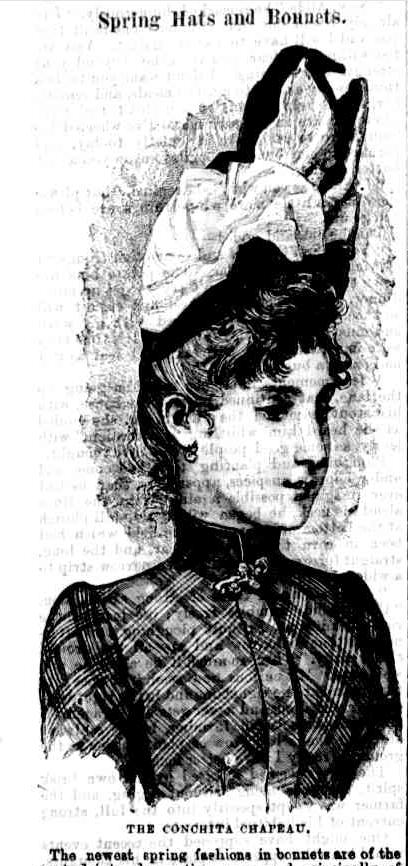
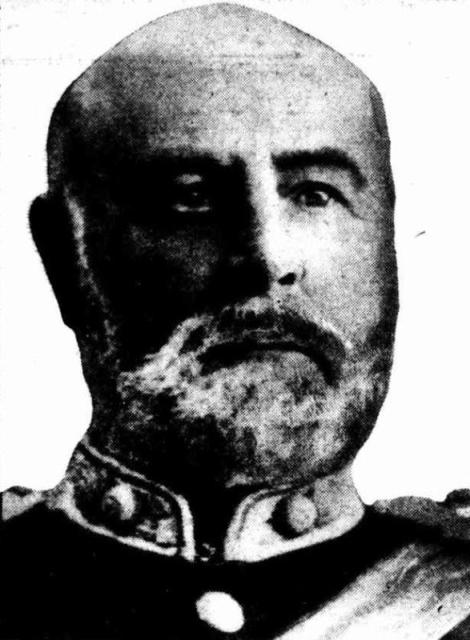 Chain stores follow bright idea
Chain stores follow bright idea
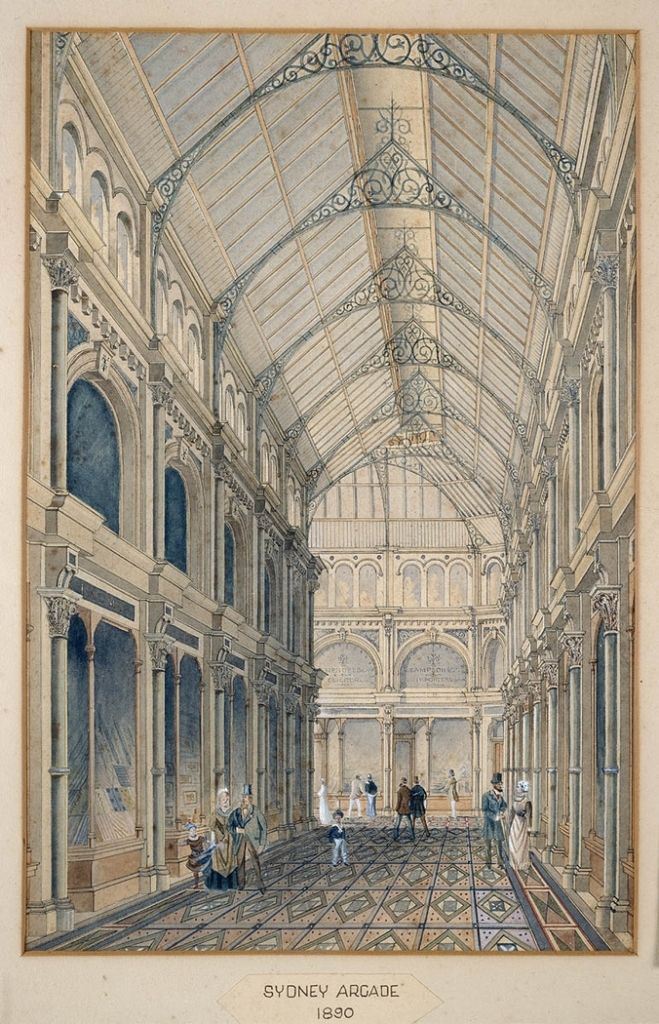
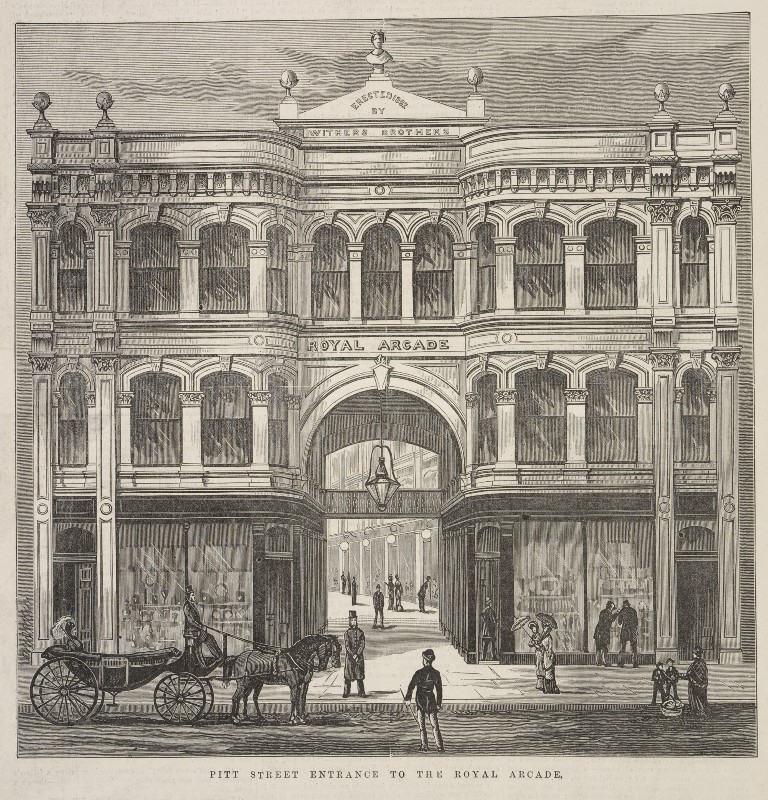
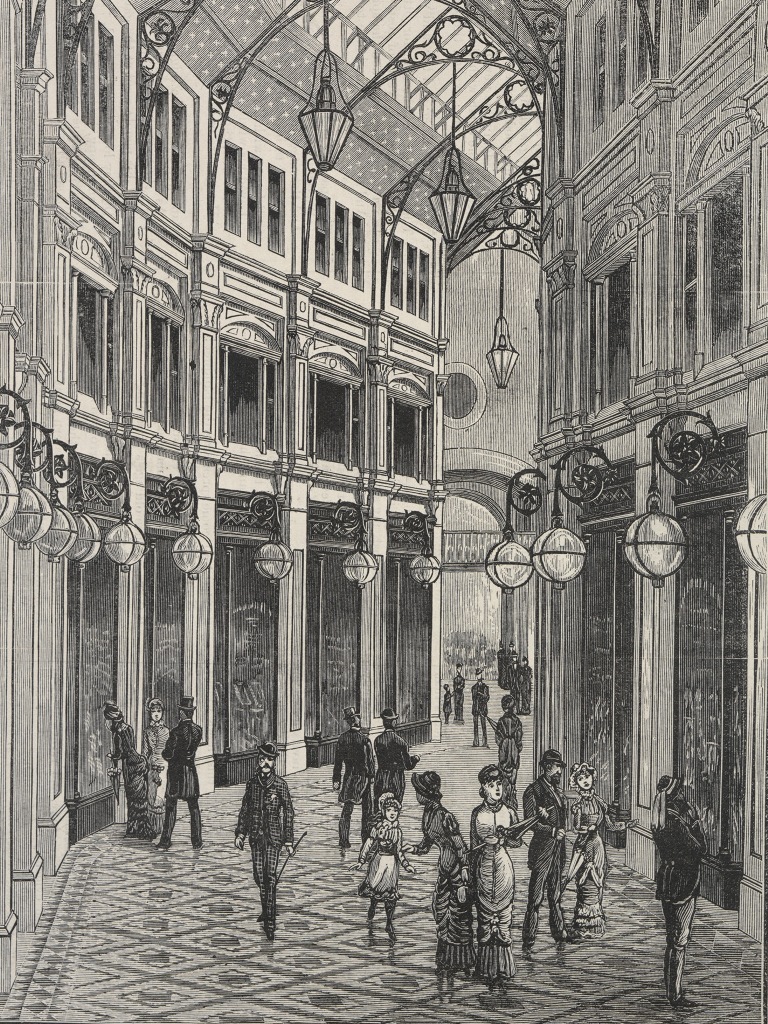
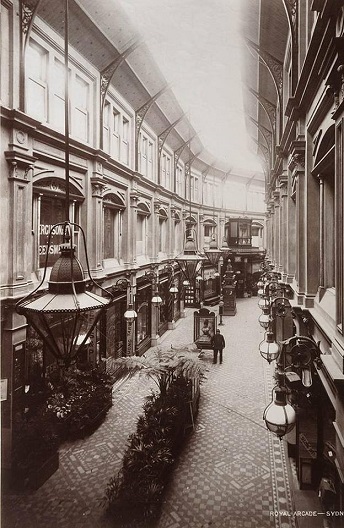
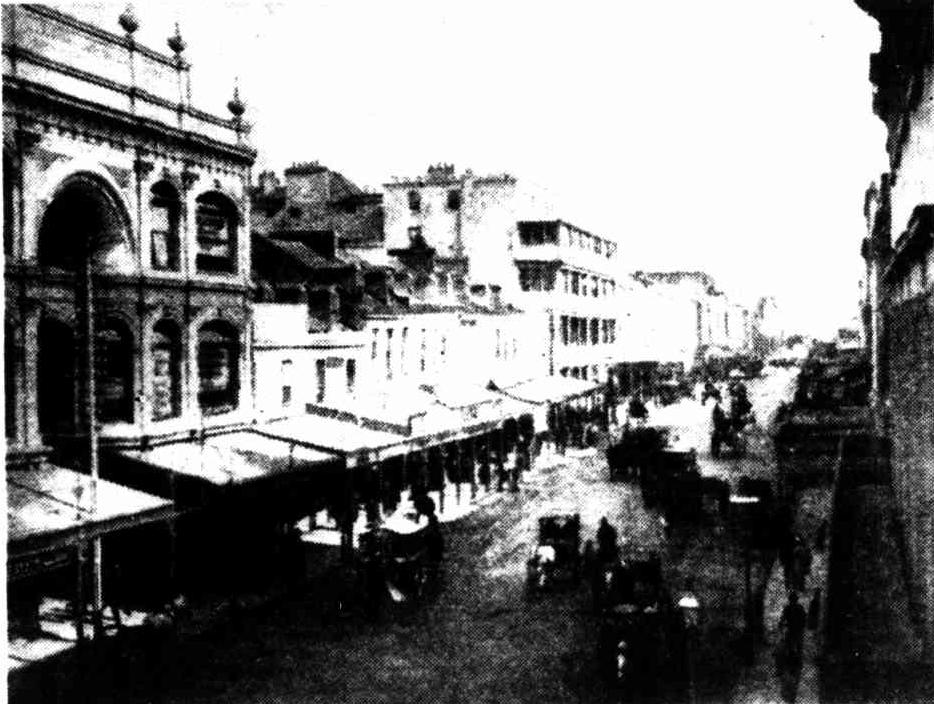
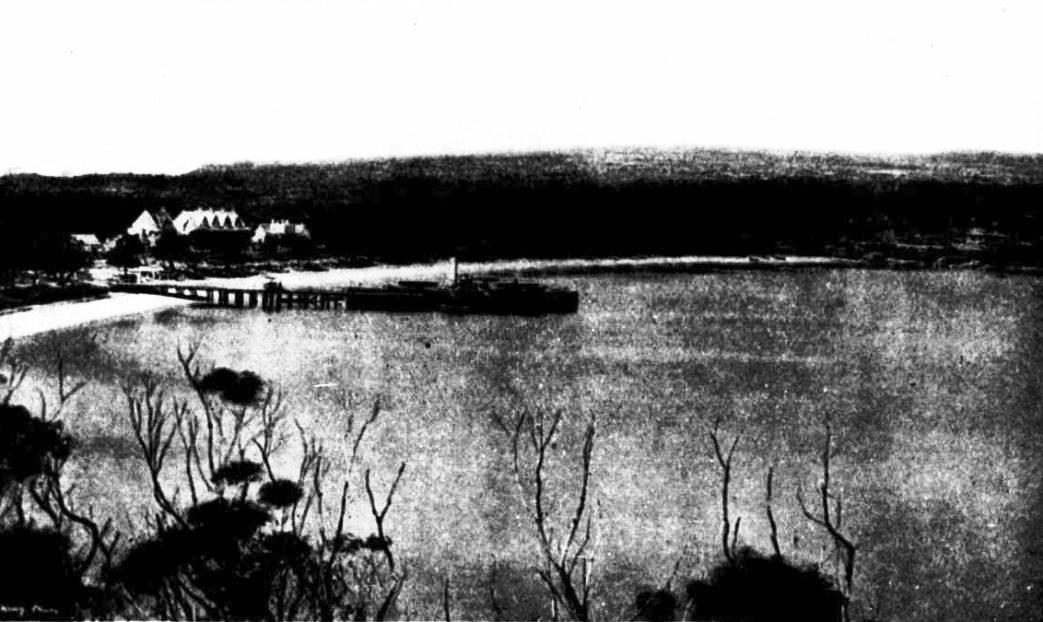
Does anyone else think the bonnet (hat) worn by the lady in the photograph above ' Manly Wharf, circa 1885-1887 looks like this one, the 'Conchita Chapeau' from an illustration exhorting fashionable women to indulge in Spring Fashions and go....shopping....?:

THIS SUNSET BONNET.—This together with the "sunset" parasol, is said to well become a pretty woman. The latest shape was the merest triffle in size, consisting of three or four rows of finely drawn ...(1887, July 23). Australian Town and Country Journal (Sydney, NSW : 1870 - 1907), , p. 34. Retrieved from http://nla.gov.au/nla.news-page5097070
SALE TIME.
Scene, bedroom, suburban house. Time, 9.30.
Mamma discovered reading Bargain Column of the paper. Daughter dressing for town.
Daughter (brushing out her hair rapidly): "I don't know why you ever want me to go to these stupid, senseless sales. We don't want anything-not a thing (brushing her hair with alarming vigour) but a wardrobe -and we've wanted that for ages and a-ges and a-a-ges (beginning to comb out the knots with a vengeance). You can't see half the shop windows now for parcels and people; and I suppose lots of them want a wardrobe or u picture, or an easy chair, or something equally useful and essential, like us.
Mamma (continuing quite calmly in her reading) : "Home frocks-for morning wear In prints and linens-trimmed with embroideries, all sizes. Caroline, my dear. Usual prices, 32s 6d. Sale price, five and eleven. 5/11. I must have one."
Daughter: "But, Mamma, you don't want a house frock. Didn't we buy ordinary print at ordinary time, and make two dresses for less than 5s 6d?" .
Mamma: "But think of the embroideries And they were 32s 6d."
Daughter (doing up her hair hastily): "Embroideries about a house when a nice apron would cover any ' defects (pushing a hairpin into place). Couldn't we save up for a wardrobe instead, Mamma?"
Mamma (still reading): "All wool knitted golfers All colours Reduced from 8s 11d to 4s 11d. Have a look at them, dear They might come in nicely next year "
Daughter "Aren't you sick of the sight of golfers'' I am And It's almost certain that no one will want to wear them next season
(She begins to pull on her shoes somewhat savagely) Fashion is a fickle jade at her best '
Mamma "Well, here s exactly what we want Slightly soiled dressing gowns-"
Daughter Give me a cracked wardrobe for preference (ties her shoelace determinedly) At any rate, we could hang clothes in it but what were going to do with soiled dressing gowns I don’t know '
Mamma You re certainly very rude, Caroline Allow your mother to know more than you. Get two dressing gowns. Hullo, what's this? Blanket slaughtering and-double green coupons "
Daughter 'But, mamma, the winter is nearly over and we don’t want blankets in summer time And where are we going to hang our starched frocks it we haven’t a wardrobe'"
Mamma "We can put the blankets away till next year. It isn't every day you got double green coupons, Caroline”
Daughter "But the moths and silver fish don't make any allowance for green coupons "
Mamma "Well, what about some gloves' We always want gloves Or laces, child You will want laces, for your summer frocks "
Daughter (putting on her hat) "Well, let's have a look at them "
Mamma Laces-laces-l-a-ces. I saw them somewhere "
Daughter I don't think there are any worth speaking about"
Mamma 'Caroline, I must say again that you are in a positively ugly mood this morning In fact, you’re almost disrespectful. All your aunts go to the sales-some of your uncles too (throwing down the paper) I thought you wanted to go and have a look round and buy a few cheap things Don't you' '
Daughter 'No, mamma, I want you to buy a wardrobe with the money you wished me to spend on the useless bargains And I didn’t mean to be disagreeable at all "
Mamma Well, well don’t get down-hearted about it child And as you-say it is, absurd to buy winter things for summer, perhaps I’d had better get the wardrobe "
Daughter “Mamma, you’re a darling-a darling, I knew you would see what was right in the end. Now we need not stand on chairs to see the set of our skirts any more (She takes up her purse and goes to the door followed by mamma)
Mamma Have a good look about before, you decide dear '
Daughter Of course You don’t want anything else?”
Mamma: “No, only you might get a few handkerchiefs and perhaps a pair of stockings at the double green coupon shop.”
Daughter (laughing) Very well mamma. But I’ll have a look at the wardrobes first. Goodbye. (goes, down the path quickly)
SALE TIME. (1912, July 17). The Sydney Morning Herald (NSW : 1842 - 1954), , p. 5. Retrieved from http://nla.gov.au/nla.news-article15337285
In some departments the more things change the more they stay the same - although the writer of this item may have incited a few to do the opposite of this probably well-intentioned advice!:
JULY SALES.
The winter sales are in progress, and there are but few women 'who do not really enjoy the shopping excursions that they have reserved especially for the winter sale-time. Sales convey at once the impression of replenishing household stocks and that fascinating hobby— finding good remnants. It would be very interesting to discover how many women can really resist considering the purchase of articles that are marked down in price. When every purchase is a bargain, then shopping is done with an additional zest. Every woman knows the need for greater adherence to method in her home, and the household inventory, which used to be the housewife's pride, has returned to its own through sheer necessity. The attractive index cards that are obtainable really helps to make the routine business of the home much easier, for it takes but a moment to note down that a sheet or a towel is beyond ordinary use again, whereas if there is no note book or index handy, then the fact is not recorded, except in memory, which is sometimes treacherous. At times such as the present, when there are genuine reductions in-practically every line that the housewife requires, the information that those cards should contain would be of the very greatest service to her in helping her to purchase the required articles, instead of running the risk of over stocking.
It would be futile to put aside just a few hours for sale shopping. A whole day is necessary for the careful selection of the bulk of articles that are to be bought. Some time has to be spent at the manchester department, almost as much at the hardware, china and haberdashery, and by the time this is done it will be well on towards evening. Fortunately, practically all of the large establishments have made ample provision for the comfort of the woman shoppers, and lounge and refreshment, rooms are provided in them all. That, of course, makes things very, much easier for the women who have but a limited amount of time to devote to their gale shopping, for they can obtain refresh-meat and can rest without appreciably interfering with their programme. Then, having attended to the bulk of the shopping, there are many etceteras that claim attention, among them the remnants of which will no doubt serve some very useful purpose at the hands of the skilful needlewoman. The woman who is not prepared to be interested in her shopping is going to lose out on the spirit of sale times. Perhaps she is setting out aimlessly, not quite sure what she wants or what will be of any use to her. As the shops are such busy centres at times like these, it would be far better for her to postpone her shopping until she has been able to make some sort of cursory examination to discover her needs. The aimless shopper at sale time is certain to find that she has bought all sorts of things that are of no use to her while the things that she really needed were overlooked altogether. To set out with a basic list, and to set out intent on enjoying every moment of the time spent shopping, is most satisfactory from every woman's point of view. JULY SALES. (1927, July 5). The Age (Melbourne, Vic. : 1854 - 1954), , p. 5. Retrieved from http://nla.gov.au/nla.news-article206179490
Manly Shop Facades and frontages were echoed in Arcades built by the first Mayor of Manly, Thomas Rowe - even buildings have fashions!
 Chain stores follow bright idea
Chain stores follow bright idea Thomas Rowe— man of ideas. First mayor of Manly
by Isadore Brodsky
Right: Thomas Rowe— man of ideas.
LIFE has quickened in Sydney's old world arcades beyond the expectations of many, but only to the degree envisaged by their innovator, Thomas Rowe, whose name is perpetuated in the little street near the Hotel Australia. The architect who conceived those arcades at the beginning of the 80's had two aims — a greater area of shop frontage and reduction of the length of blocks, inviting and permitting pedestrians to take short cuts, and, at the same time, to run the gauntlet of the traders. The arcades came in where courts and places had been allowed to end blindly, and where there had been little to entice the explorer to their depths.
Rowe put his first arcade, the Sydney, on ground that has historic and piquant interest. It was once the possession of William Hutchinson, who served the convicts, not only as their chief superintendent, but also as their banker, a fact which “somewhat shocked Mr. Commissioner Bigge" when he reported on Governor Macquarie's administration of the infant colony.
Profit for estate
The arcading, with glass for roofing, joined King St. to George St. by an elbow, and cost £30,000 to build. The fruits of Rowe's conception were never fully realised in this arcade, though it brought a harvest to the Hutchinson estate. It was sold to Dymock's for £120,000 in 1919, and Hutchinson's beneficiaries received a total of £279,000 as a result of his original holding, which included the site of Belfield's. Hutchinson's name is still to be found in the crook of the elbow.
Rowe's next project for an arcade was on the site of the Bull's Head, in George St., opposite the opening between the sheds of the old markets. "A red bull's head faced on to George St.. and it was an old hotel when I saw it in 1874," the veteran sportsman and solicitor F. E. Mcintosh says. "The Bull's Head was sited on a grant to my grandfather, Robert Mcintosh, who was once the organist at St. James."
Robert Mcintosh's sons, Robert and Jim, quarrelled, and one night Jimmy's sons took possession of the Bull's Head while Robert's sons were at the theatre. The lawful occupants pretended, on their return, not to know the interlopers, and called the police to eject them. Robert eventually exploited his holding by entering into a contract with the Withers Brothers, who had a little drapery shop nearby.

Interior of the Sydney Arcade, Thomas Rowe, 1890. Courtesy the State Library of NSW, Image No.: a128781h
Dispute over roofing
The Withers built the Royal Arcade, in conjunction with George Hill, who owned the Pitt St. side, but the Mcintosh family has never relaxed its original hold, canny Scot folk, and a great-grandson of Robert, Noel Mcintosh, QC, is the present chairman of directors of the arcade. After Angus and Coote had bought the Hill interest for £44,500 in 1931, a dispute arose concerning the glass roof over the arcade. This had been one of the glories of the Renaissance style arcade, but now it had become somewhat dangerous. "E. J. Coote wanted to take the roof off, but he couldn't get Mcintosh to agree," Beatrice Phillips, an old employee of the jewellers, said.

The Pitt Street entrance and the interior of the Royal Arcade, erected by the Withers Brothers (Illustrated Sydney News, 25 November 1882)


The Royal Arcade - circa 1892
"Finally"
"Finally he took off his half, and the wind did the rest," she added. Nevertheless, the Royal Arcade goes on, the haunt of philatelists, old and young. New Eastern culinary odors leplace the Continental blandishments of Madame Pura's Latin Cafe. Gone are all traces of the ancient waxworks of Cristofani and Ghiloni. The Victoria Arcade is almost an extension of Rowe St., but it cannot be claimed for Rowe. Inside the arcade in the half light the name of the architect, C. A. Harding, can be seen.
Tragedy on the site
The arcade's downhill grade from Elizabeth St. quickens the natural pace, and hardly permits any proclevity to dawdle, while the uphill stretch finds many with bellows to mend. In its earlier years the Victoria Arcade boasted of its typewriters, not in the modern sense, where it refers to the machine, but to the first legitimate use, by women (and men) who operated the type. Some time before the arcade site was chosen a hairdresser named Scurrah conducted his business in one of the tiny shops fronting Brougham Place, as it was known before it became Rowe St. According to the chronicles . . .

Photo: George St., Sydney, in the heyday of the arcades. The Sydney Arcade is in the foreground, while Foley's Hotel still occupied the site of the Strand Arcade.
Before Rowe began the third of his arcades, the Imperial, he conducted a competition among the bright young men of his staff for a design for the Pitt St. and Castlereagh St. frontages. Alfred Spain's design illustrates the facade at the lower level, while that part which faces the position of the old Girls' High School, now covered by the St. James Theatre and David Jones, was the work of J. A. Kethel. The Imperial Arcade building was a benefaction to that part of Castlereagh St. at the time (1890), and some of its lustre was later to be physically transmitted for the benefit of Harry Rickard's Tivoli, which was lit by electricity from Joynton Smith's plant in the arcade. The benefit to Castlereagh St. boomeranged in a favorable manner many years later, when David Jones made its expedition to the street, for the arcade led right to its doors.
The Strand Arcade was opened in 1891. Four hundred guests assembled, for the glittering triumph on April 1 of Gates and Dillon, the joint entrepreneurs of the venture.
A short time before, the celebrated and notorious White Horse Tavern had been on that spot, and it was there that prize-fighting reputations were made and unmade in the presence of Larry Foley. The Black Prince, Peter Jackson, was Foley's right hand man and instructor; Bob Fitzsimmons and others met in Foley's ring. To crystallise reminiscence of a more palatable type of the Strand how many would care to go beyond the fabulous fruit salads of B. O. Lane?
Gastronomic delights
Fruit was cheap, of first quality, and served with a generous hand. Icing sugar was heaped on, and according to taste. And then the succulent sweet was topped off with pure rich cream. All for 3d! After Lane there were the Silvester Brothers, who sliced beef and ham with rapier-like blades, spearing recalcitrant titbits with the same implement, long before the machine age lessened the time, and cut some of the tantalising moments. The same Strand captivated other senses, too: the fragrant myrrh and sandalwood of the Saleh's eastern bazaar could be freely inhaled before the stimulating odors of Harris' freshly-ground coffee were to be savored. Lolly pigs and giant walking sticks of pink and white peppermint kept many young eyes and noses glued to the windows.
First Mayor of Manly
Thomas Rowe began to practise as an architect in Sydney in 1856, and some of his works are monumental — St. George's Church, The Great Synagogue, Newington College, Sydney Hospital, among them. He was the founder and president of the Institute of Architects for many years. He was the first Mayor of Manly, and is credited with planting those magnificent Norfolk Pines. His son, Ruskin, keeps up the name and profession, and proudly points to the fact of his initial part in the planning of Her Majesty's Arcade. He was not invited to finish that work.
From theatre to chain store
And yet the hand and mind of Thomas Rowe was behind Ruskin when he carried out the demolition of Her Majesty's Theatre, a tragic sacrifice admittedly, for the installation of Woolworth's chain store. For what is the great chain store, and many of its counterparts? Only our old friend the arcade all over again, leading from one street to another, past the varied and brightly - lit wares, placing the temptation and the tempted in juxtaposition, just as Thomas Rowe had planned it nearly 75 years ago.
Chain stores follow bright idea: 75-year-old (1954, October 7). The Sun (Sydney, NSW : 1910 - 1954), , p. 33 (LATE FINAL EXTRA). Retrieved from http://nla.gov.au/nla.news-article229221873
Manly Municipal Jubilee
Half a Century of Wonderful Progress
In the growth and progress of Manly during fifty years we can trace surprisingly accurately the ratio of development made by the big city across the gleaming blue waters, if or, as Sydney grew mile by mile, the 'village,'' as Manly is fondly termed by residents, made relative progress.
MANLY is fast taking on the appearance of a city, and is spreading north and west into populous suburbs which indicate, as surely as anything can, that the Manly of half a century hence will show just as great progress relatively as that which has occurred during the last fifty years — that is, since the incorporation of Manly as a municipality in 1877, 50 years ago. In that time, seemingly long in the history of a new country: but only the measure of two generations, Manly has grown from an obscure waterside village — a real village then — set in scenes of primitive grandeur not far removed from when it was the happy hunting ground of the coastal blacks, to a proud position amongst the finest seaside residential areas of Sydney, and one of the most popular pleasure resorts in the Southern Hemisphere.
Captain Phillip's Visit
MANLY has the distinction of being one of the landing-places on the first visit ever paid by white men to Port Jackson — that of Captain Phillip, who entered the harbour on January 21, 1788. This was only three days after the arrival of the First Fleet in Botany Bay, after a voyage lasting since May of the previous year, and after Captain Phillip had come to the decision that Botany would prove unsuitable for establishing a settlement. The records show that after entering the Heads the expedition in three open boats proceeded for a short distance south, and made its first landing at Camp Cove, near what is now Watson's Bay, near a point upon which a memorial tablet was unveiled a few days ago. No doubt from here the navigators got a clear view of the beautiful land-locked waters near Manly and North Harbour, for they next proceeded in their boats to Manly Cove, where they made a landing and spent the night.
In a letter written by Captain Phillip, dated May 15 of the same year, and sent to the British Government, we learn how Manly was christened. 'When first I went in boats to Port Jackson,' he wrote, 'the natives appeared armed near the place at which we landed, and were very vociferous; but, like the others, were easily persuaded to accept what was offered to them. The boats, in passing near a point of land in the harbour, were seen by a. number of men, and some of them waded into the water unarmed, received what was offered to them, examined the boats with a curiosity that gave me a much higher opinion of them than I had formed from the behaviour of those seen in Captain Cook's voyage, and their confidence and manly behaviour made me give the name of Manly Cove to this place. The same people afterwards joined us when we dined.'
'A Village Hampden'
FOR many years Manly remained in its state of nature, and even fifty years after Captain Phillip's first visit there was only a collection of huts and a population of 43.
The name of Henry Gilbert Smith will always be associated with the pioneer work of creating the Manly which was soon to be set on the high road of progress and prosperity. He built the Pier Hotel, upon the site of which now stands the modern Hotel Manly, and it was due to Mr. Smith's remarkable public-spiritedness and foresight that Manly is now so splendidly endowed with beautiful parks and reserves.
In the elegant Jubilee Souvenir of the Municipality of Manly there is this tribute to Mr. Smith: — 'To him the municipality is indebted for Kangaroo Park, Town Hall Park, Central Park, and Gilbert Park. Many of our elegant pine avenues owe their origin to Mr. Smith's activities in planting trees, and in inducing fellow-residents to follow his good example, including Mr. C. H. Hayes, who was responsible for the pine trees gracing the Ocean Beach. Henry Gilbert Smith was 'a village Hampden' with dauntless breast, and to him Manly, as it stands to-day, owes much.
Many stories have been told of the kangaroo on the hill which has been a silent witness for 70 years of the growth and development of Manly. It has been reported that Smith gave a commission to a stonemason named Youler in 1857 for the kangaroo, his intention being to attract visitors to Manly and induce them to climb the hill. One man so charmed was the patriot W. B. Dalley, who decided to make his home on a near-by site, and erected what is known as 'Dalley's Castle.'
Visit Issue 192: Manly's Stone Kangaroo, Camera Obscura, First Maze and 'Chute' - Fun Days in Sea Hazes from 1857 On
The lack of a regular service had much to do with keeping Manly in its primitive state for so many years. In 1854 Mr. Smith chartered The Brothers,which made the trip as the occasion warranted; but a more regular service by paddlesteamers — Emu, Pelican, and Black Swan — was commenced. The Rapid and the Victoria, which ran afterwards, were succeeded by the Phantom, first of the Port Jackson Company's now modern and fast fleet, which provides a frequent and pleasant service for those living in or visiting this popular resort.
Manly's Incorporation
THE incorporation of the Manly municipality was dated January 6th, 1877, the proclamation being made under the seal of Sir Hercules Robinson, then Governor of the colony.
The first, poll was taken on February 13th of that year, when Charles Hayes was elected at the head with 101 votes, and two days later Alderman Thos. Rowe, was elected first Mayor of the municipality. Alderman C. H. Hayes occupied the Mayoral chair for three years — 1882-3-4. He had a splendid record as a Mayor and citizen, and during his occupancy of the chair Ivanhoe Park was made available as a public park, no less than £7300 being paid by the Government for this resumption. 'This act alone,' said Dr. Thomas, ex-alderman, in unveiling the mural tablet inscribed with the names of Manly's Mayors in the Council-chambers some years ago, 'should place the people of Manly as debtors to Mr. Hayes for all time — a man who, more than any other, for 17 years directed the destiny of Manly.
In the years since then other Mayors have been Alderman E. W. Quirk (1901 to 1906), Alderman Bonner (1908-14), Alderman Heaton, Alderman Reid (191921), Alderman A. C. Samuels (192425), and the present Mayor, Alderman A. T. Keirle, who has occupied the chair on seven occasions. A native of Somerset, Mr. Keirle came to Australia in 1884, and, through varied experiences of the press, in the law, and in commercial pursuits, he has achieved business success and well-deserved popularity for his work in the public interest. His patriotic work during the war is well known, and it was largely through his enthusiastic leadership that the municipality was placed on the scroll of honour in the War Loan competition. Keirle Park, near the Manly Lagoon, stands as a monument to the success of his reclamation scheme, but that is, only one of a number of beautification schemes which this energetic Mayor has consummated. He was also an enthusiastic advocate of the Spit Bridge, which has done so much to bring Manly nearer the city. The Town Clerk, Mr. Leslie C. Wellings, who was appointed in 1921, succeeded the late Mr. Danllogan, a great authority on local government, who had held the position for 21 years. Mr. Wellings was one of the first amongst Manly boys to enlist, and he had distinguished service to his credit on several fronts.
A VIEW OF MANLY FROM THE AIR.
A CARNIVAL STUDY.
CARNIVAL TIME AT MANLY.
Manly’ s Progress
GREAT as has been the progress of Manly during the last two decades, those best endowed to give an opinion regard the advancement of the past as quite modest compared with the prospects before the Manly of the future. Manly has been singularly free from boom periods, progress during the last twenty years showing but little departure from steady advancement. The population has grown from 13,599 in 1914 to 25,000 last year, being at the rate of about 1000 per annum, an increase which indicates clearly that its advancement is more rapid than that of either the city itself or of country towns. This shows that it would be a great mistake to regard Manly as merely a large popular pleasure resort, for its population to-day is a more steady factor than ever it was, and land values are maintained on a very firm basis. Values in such thoroughfares as the Corso are on a par with some of the prices asked for city land a few years ago, and the demand for land near the harbour and ocean fronts for residential purposes has given such sites a high value which is not likely to retrogress. The unimproved capital value of land in the municipality in 1914 was £1,195,992, and last year it was estimated at £3,648,530. The municipality has a completely modern service of electric light and power, now owned by the council, which purchases electricity in bulk from the Sydney City Council. There are now about 5000 consumers, and over six hundred street lamps are in use. The Manly Gas Company has been in operation since 1883, and the number of consumers has increased from 200 originally to 6800 to-day, consuming 200 million cubic feet per annum. Manly also has the advantage of modern sewerage.
The Corso
ONE of the most striking features of Manly is the Corso, which distinguishes Manly from all the other marine suburbs of Sydney. Nature could not have been more prodigal in its gifts to man than by the generous treatment it has lavished on this beautiful watering resort. On the harbour side there is the incomparable harbour beach, beach, where the translucent waters of historic Manly Cove gently lap the white sand and sea wall, while to south and north are many picturesque indentations where the harbour shores' sweep towards North Head and North Harbour. The narrow neck of land separating the harbour from the ocean, which gives Manly its splendid distinction, is intersected primarily by the Corso, which has ever been the business hub.
The competition amongst business men to secure a site on the Corso has made land values soar enormously there, and it has resulted in the rapid modernisation of its buildings, until today the Corso has the appearance of a city shopping centre. Yet in 1877, the year of Manly's incorporation, the Corso was, according to Mr. R. J. Wild, who came to Manly in that year, 'only a sand track.' Mr. Wild, in giving his reminiscences to the publishers of the Jubilee Souvenir, said : 'On the left side there were the Pier Hotel, a few weatherboard cottages, a grocery shop and post-office, two other shops, and a house called Bolton's cottage. Then, besides a few other small shops, there were two hotels, including the Steyne,' which is still one of the leading hotels to-day. On the other side of the Corso there were even fewer buildings, one of which was the Church of England, which has since been twice enlarged. Today the Corso, as the principal shopping centre, is completely self contained, and one can there purchase almost anything required for a modern home.
The Ocean Beach
THE Corso leads directly to the Ocean Reach, which is famed throughout Australia for its beauty of contour, its magnificent avenue of Norfolk pines, and for its delightful surfing. It is surfing which has proved probably the best asset to all Sydney's oceanside resorts, and in no case has this been truer than of Manly. Little more than a generation ago this pastime was actually discouraged, for it was against the law that one should bathe in the surf during daylight hours, and then only in the most all-encompassing garments. Fortunately, surfing has come into its own because of its undoubted pleasure and health giving attributes. The tide, once turned, has swept with ever increasing force over Sydney's inhabitants, and every beach within reach of the city has rapidly grown into favour, first amongst surfers, and then as residential areas. Manly has large and well-appointed dressing pavilions, which are always crowded during week-ends and holidays. Surfing has its tens of thousands of devotees, and alongside the bathers are those more venturesome spirits who paddle out on their surf-boards beyond the ordinary breakers to await the big waves which will carry them right to the beach while they standup, poised adventurously above the sweep of the foaming breaker.
Manly's reconstructed municipal baths, probably the best-equipped in Australia, were officially opened on October 30 of last year.
Jubilee Celebrations
MANLY IN THE SEVENTIES.

Fifty years ago Manly was — or seemed — remote from the city. The picture gives a view of the harbour front shortly before the incorporation of the municipality.
MANLY'S civic spirit was stimulated by the event of its approaching fiftieth birthday to do something on the grand scale to fittingly commemorate the occasion. To arrange for a six months' celebration might seem a rather ambitious scheme, but it caught the public imagination, and the Jubilee Committee set enthusiastically upon its task. Local business people gave their hearty support to the scheme; Manly Municipal Council offered a guarantee of £1500 and the Port Jackson and Manly Steam Ship Company, Ltd., gave a donation of £500. The committee, under the secretaryship of Mr. James A. Miller, arranged a comprehensive programme of fixtures for the six months, which covers practically every activity, including sporting, musical, and social entertainments, which are calculated to make such an impression on visitors that they will be tempted to live permanently in the idyllic surroundings of this delightful waterside suburb.
The celebrations were officially opened by the Governor, who was accompanied by Lady de Chair and Miss de Chair. The Venetian Carnival which is now being held gives a romantic touch, to the Esplanade and waterfront with its festoons of electric lights amongst the waterside houses and trees, and out on the water illuminated boats gliding to and fro across the sheltered cove. Along the Corso, ablaze with myriads of coloured electric bulbs, stalls are erected for the sale of various articles by volunteer sales men and girls, while on the ocean beach there are numerous sideshows for adults and children, including the old-fashioned but ever-popular Punch and Judy shows, acrobatic turns, and merry-go-rounds brought up to date with aeroplane seats. The thousands of visitors who annually make Manly their holiday Mecca have entered into the spirit or the carnival, and on the principal nights the stalls and shows have been crowded with gay throngs bent on enjoying the fun. On Anniversary Day there was a record crowd at Manly, and the jubilee stalls did a thriving trade. Manly Jubilee: Continued Page 10.
The features of holiday-time at Manly have become famous beyond Australia. Vivid snapshots of the magnificently-built brown men of Manly Beach engaged in their thrilling sports in the surf have given 'The Village' a fame that rivals that of Honolulu. On the occasion of displays by the surfers groups such as our artist depicts throng the sands (see sketch below). Manly municipal Jubilee (1927, February 2). Sydney Mail (NSW : 1912 - 1938), , p. 8. Retrieved from http://nla.gov.au/nla.news-article169144790
For more on a few interesting Manly Carnivals, visit Issue 250: In Surf Life Saving Carnival Season: A Glance at Surf Carnivals in February 1909, 1919, 1925, a Fancy Dress Rise of Venus and Saving Lives with Surfboards
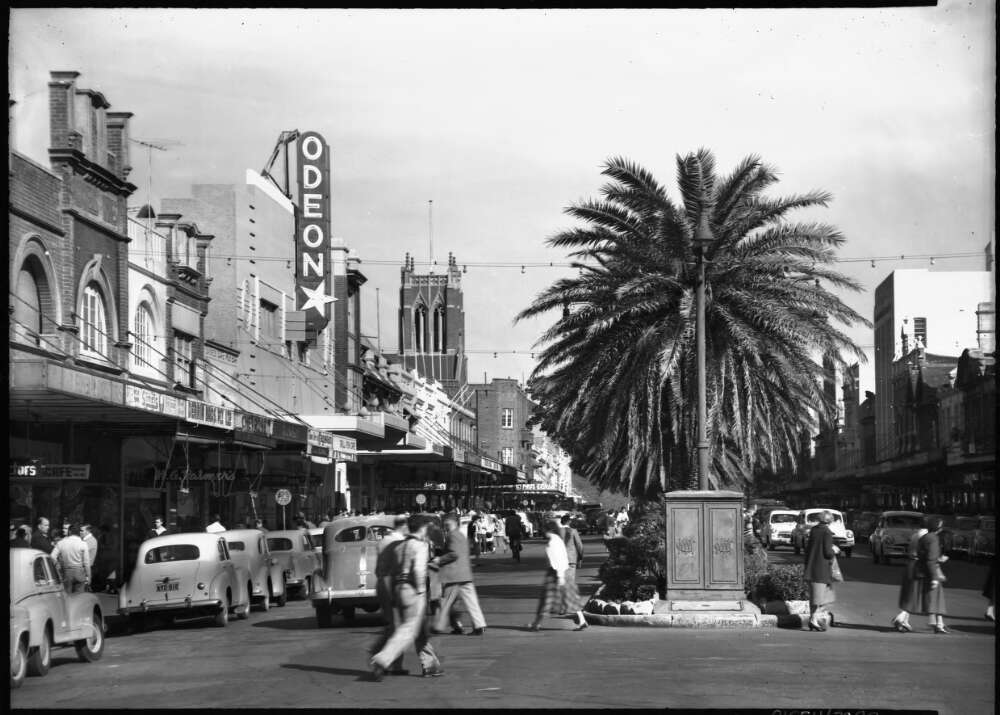
Corso Manly [the Corso, Manly's famous pedestrian plaza] photo by Frank Hurley, courtesy National Library of Australia http://nla.gov.au/nla.obj-159999114
Shopping And Shops In Manly: Sales Times From 1856 To 1950 For A Fishing Village - threads collected and collated by A J Guesdon, 2016.